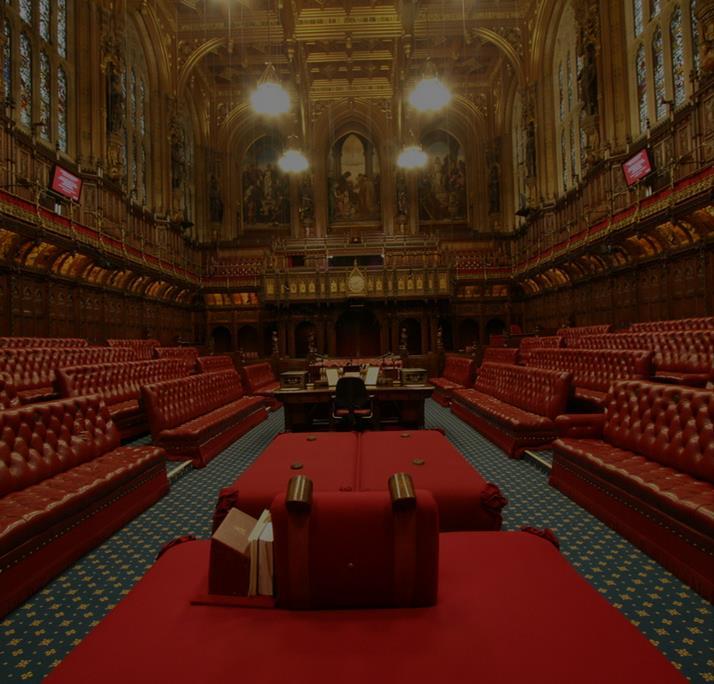
JUNIOR POLITICS JOURNAL






 Edited by Aayush Kampani
Edited by Aayush Kampani
Special Thanks to Mr Wearn & The History Department
Politics is a hugely diverse and dynamic discipline referring to the actions associated with the governance of a group of people. It is not only associated with decision making, but other forms of power relations among individuals and countries. There is no doubt, therefore, it has a direct and tangible influence on all of us.
Within this journal, the importance of politics has shone through. I have been astounded by the quality and depth of the articles written. They capture the broad and ever-changing nature of politics, some reflective of past events and their political relevance to today, while others seeking to scrutinise political ideologies and constructs that have formed the mechanisms for our political system for decades. And all these articles have relevance to our modern world in which our lives are interconnected with politics
Alongside articles written by students across all years, we have documented some of the insightful interviews that took place during St Olave’s inaugural Political Awareness Week 2023 led by Eythan, Hugo and myself. This journal forms an addition to the vast array of extra-curricular activities within St Olave’s that promote the importance of politics to all years, alongside Junior Politics Society and Political Awareness Week.
We hope you enjoy reading this journal and would like to thank everyone who contributed, especially Mr Wearn.
Aayush Kampani Editor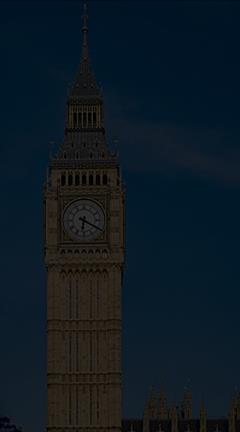
Junior Politics Society has evolved since the inception to become a highlight of my week. Led ably by pupils each week and discussing a range of topics, both in terms of current political ideas but also historical political events of note. During this time, there has been a desire to create a journal, giving pupils the chance to write, research and explain topics which are important to them. This journal is the product of hard work from all of those who have submitted articles, but also from Aayush, Eythan and Hugo who have co-led the society since the beginning. Their hard work and passion shines through here. For my own part, I hope that the articles here serve as a springboard for our wider community to engage with political learning and grapple with the academic challenges the subject has to offer.
Mr Wearn

During your talk, you spoke about your education, would you tell us a bit more about your route into politics, and the basis for your ideals?
I did A-level Government and Politics, at a college just down the road from this school. I then went on to study Government Politics at the University of Kent, followed by a master’s there that focused on European politics. At the time, European politics was at the forefront of the news, with the 1992 Maastricht Treaty. It basically set up the European Union and transformed what was the European Economic Community into the EU. I was instinctively Eurosceptic, but I wanted to find out if I was right, so that is why I decided to do my master’s in European policy, with my focus on democratic deficit in the EU. Was it real? And if it was, what should we do about it? And my conclusion was that nothing could be done, so we should leave the European Union. I like to think of myself
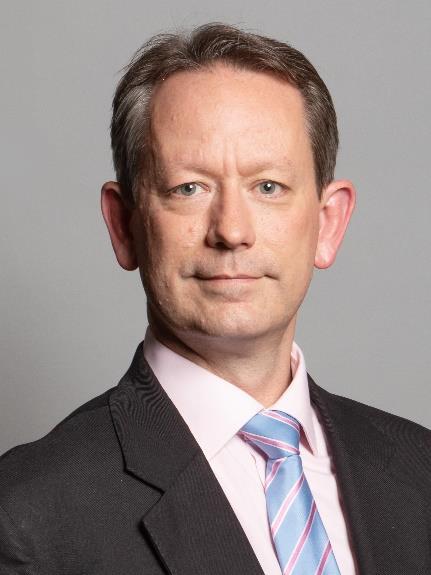
as a trailblazer for what followed many years later [the 2016 Brexit referendum].
And, on that note, what would you say to students interested in politics, how do they stand out from the crowd, how do they get involved?
Well, there’s many different things that you can do. I was about 14/15 when I was first interested in politics. I went to see my local member of parliament, the former PM Sir Edward Heath. I wrote to him, and he invited me to come to his surgery. We talked, and I asked him very precociously ‘how do you go about becoming a member of parliament?’ and he said that people come to the house for various reasons. Sometimes it’s because they want to be at the centre of policy making, or because they want to have a title, or be important. He said that in his view, you need to bring something to the house with you. And what he meant was, you need to have a skill, background or an understanding of the world around you, and he very much encouraged me to do things outside of politics, and wait until I was old enough and mature enough to go in. It obviously is great advice, that I have followed and pass onto other people as well.
I studied politics, I got involved in a voluntary capacity, helping running elections for example. As well as starting

to go down that path, I also worked in the city for most of the time before I took up politics full time. And I would encourage all budding politicians to do the same. If you're interested into getting in politics, then work really hard at this school. You've got a great foundation, and you will come out of this school very academically accomplished. Focus on that. Go to university, study hard, and then try a career. Resist the temptation to go straight into politics and wait until a bit later in life. Don't go into a research department and then become a special adviser and then become an MP. Because if you do that you will only have an understanding of politics. You won't have experience of the wider world, and politics can be a very inward-looking world. And just because you know how to write a press release doesn't mean you understand everything So, I would advise you to go down the same route that I was advised. To establish yourself outside of politics, do some political work on the side before you think about making the jump.
We’ve talked a bit about your journey into politics, but what reinvigorates you to keep going?
I really believe in our country. Everything to do with the constitution and the union, they really matter to me. And I believe that this is a great country, but I think it also needs to have a great future. And it's very important to remember that politicians are custodians, they don't own the country. When you’re a politician, you're looking after the country. And that's a tremendous privilege. I mean, to be able to go and sit in the House of Commons in the same places that people like Churchill, Gladstone and some of these historic figures have sat, it’s just the most extraordinary honour. Trying to contribute to this is very important. But politicians
are human beings, some do make mistakes, but those who have abused their office are people I've got no time for at all.
Aside from the bigger picture, there's lots of little things that are vital, such as looking out for my constituents. I hold surgeries and I'm seeing people who have tried everything possible to solve their problem before they come to MP. And if you can actually solve the problem for them (and very often you can), then that's tremendously rewarding, because I know that there are things that I've done that have made a difference to people. That is what matters.
Politics is clearly your passion, but what about your party allegiance, what made you specifically join the Conservative Party?
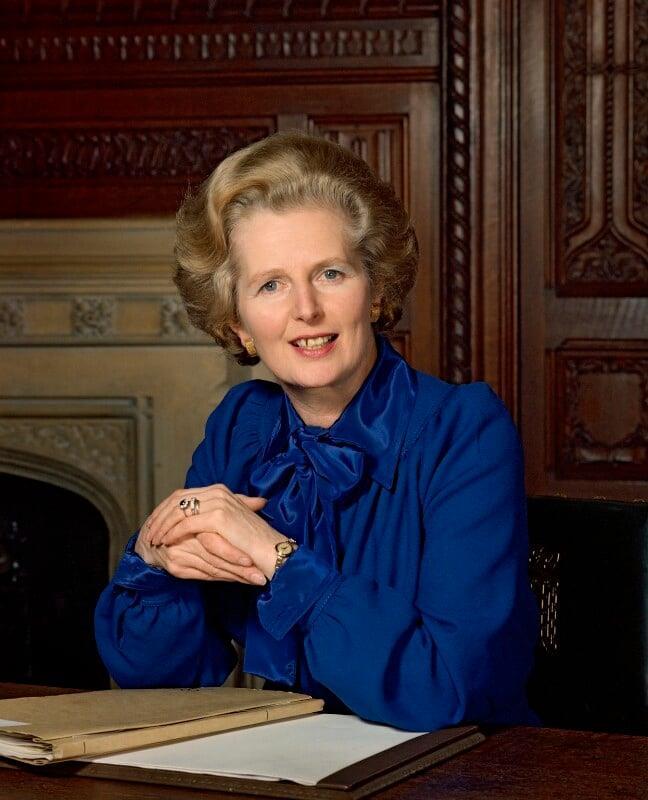
It was around 1986/87, and the country had gone through a rough patch in the 70s, and suddenly there was energy about the place. There was a focus on innovation, and the country was doing well at things like the Olympic games, which appealed to my sense of patriotism. And Margaret Thatcher was at the forefront of that. And I listened to her, and I listened to what the
Labour Party said, and it occurred to me in my youthful thoughts that Margaret Thatcher seemed very ‘pro the country’, whereas Labour was very ‘anti the country’. I couldn’t really understand the labour sentiment so instinctively I felt conservative.
My parents thought I was going through a phase - which I'm apparently still going through! They thought, if he's going to be interested in politics, let's make him as informed as possible. So, they started giving me these various books about the trade union movement and various other left-wing taxes. And when the 1987 general election came along, I started helping the Conservative Party. My mother in particular persuaded me that it was a really good idea.
How have your predecessors in the role of MP for Orpington inspired you?
Well, I know two of my predecessors as Orpington MP, both of whom, funnily enough are now in the House of Lords. But it’s a long time before I’m Lord Bacon of Biggin Hill or whatever it may be! Jo Johnson did the job for nine years, despite having no local background, from 2010 onwards. His predecessor, John Horan, is very interesting. He started as Labour MP for Gateshead but ended up joining the SDP (Social Democratic Party) following the 1979 general election, and then came back as a Conservative MP in 1992 – so he’s gone all the way across the spectrum. He's like an elder statesman to me; when I'm not sure about something, I'll drop him a line and go and see him for a cup of tea in the House of Lords and have a chat. He's a very good man.
What aspect of your political career are you most proud of?
The thing I'm probably most proud of is becoming an MP - because it's very, very
difficult. And it sort of goes hand in hand with what I was saying to you about the great honour it is, in terms of what I've done, to be an MP. At this stage of my career, it's the little things you do for people that are very big things for them personally. I'll give you one example. There was a lady who came to see me before Christmas at a surgery which I held, and her situation was that her Housing Benefit had been stopped. She and her family were made homeless. And her mother came up with a solution which is that she could rent her house (because she was going into care). But this became complicated, because her mother was the landlord, and the benefits were stopped. So, she was faced with a horror show – she had no money at all.
So, she came and spoke to me. And I spoke to her, and then found out who the relevant minister was. And then I did what MPs can do – lobby. The term lobbying comes from the fact that House of Commons is like a rectangular chamber. And then there's two corridors. These are the lobbies. These are where we vote. And when there is a vote, MPs of all statuses pile in at the same time. And so lobbying is where an MP can just go up and talk to the minister because it is the easiest way to get a hold of them. So, I spoke to her, and she agreed to look into the documentation, and she moved really, really quickly. And she changed it. She changed her decision. So, we restored the housing benefits of this lady that just before Christmas, and she told me that this was the best Christmas present she’d ever had. It’s just little things like that, that can make a real difference to people.

What aspect of your constituency are you most proud of?
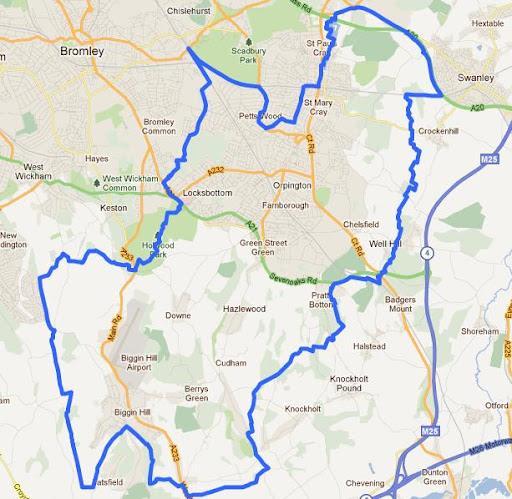
Apart from the fact that it votes for me?! I think the great thing about Orpington is that it’s the largest constituency in Greater London, because it’s so green. It’s just brilliant. You can get to central London in half an hour, but, when you come back, you can go to a place like Downe with country lanes where you feel so deep in the countryside. And the community spirit here is fantastic, there are so many people putting in so much time helping others. I love that. I’m very proud of it.
What do you think is the biggest issue facing Orpington today?
Clearly, inflation is quite a big one. The cost of living is the thing which sort of catches everyone out. At the same time, taxes are very high, resulting in people struggling to pay their bills. So, we need to get the economy back to where it was.
Next year, there will be a general election, so what is the one thing you need to do before then, whilst you are still an MP for certain?
It's very tempting when your party is unpopular to hide from people. But you’ve got to come out and talk to people, to put your case to them, tell them what you’re doing. There’s no better way of doing that than knocking on their doors, which is quite a grim prospect, but you have to reach out to people, listen to their concerns, and try to fix them where you can. As well as obviously working to address the national challenges, you have to go out and sell the product to the constituents voting for you.
Will the Conservatives win the election?
Absolutely. What I would say, in all seriousness, is that we’ve had opinion polls, but they keep changing. And whenever the polls are in the opposition’s favour, they want an election straight away. If the government succeeds in what it’s trying to do, sorting out the economy and some of the other problems, then I think it’s perfectly possible that the polls could turn. There are historical precedents for this, with the 1992 general election. That can happen. Politics is a very unpredictable beast, and I think that the Conservatives will win.
How can other young people get more involved in helping the local community and the environment, and how can we educate our opinions?
Well, by doing some of this, frankly. Getting more people asking questions to people like me. But in terms of local society, there are all sorts of voluntary things that you can do, from going out and campaigning on issues that matter to you, like green spaces or cycle lanes, to organizing Friends of the Parks groups. There’s so much more stuff that can be done, just go out and volunteer.

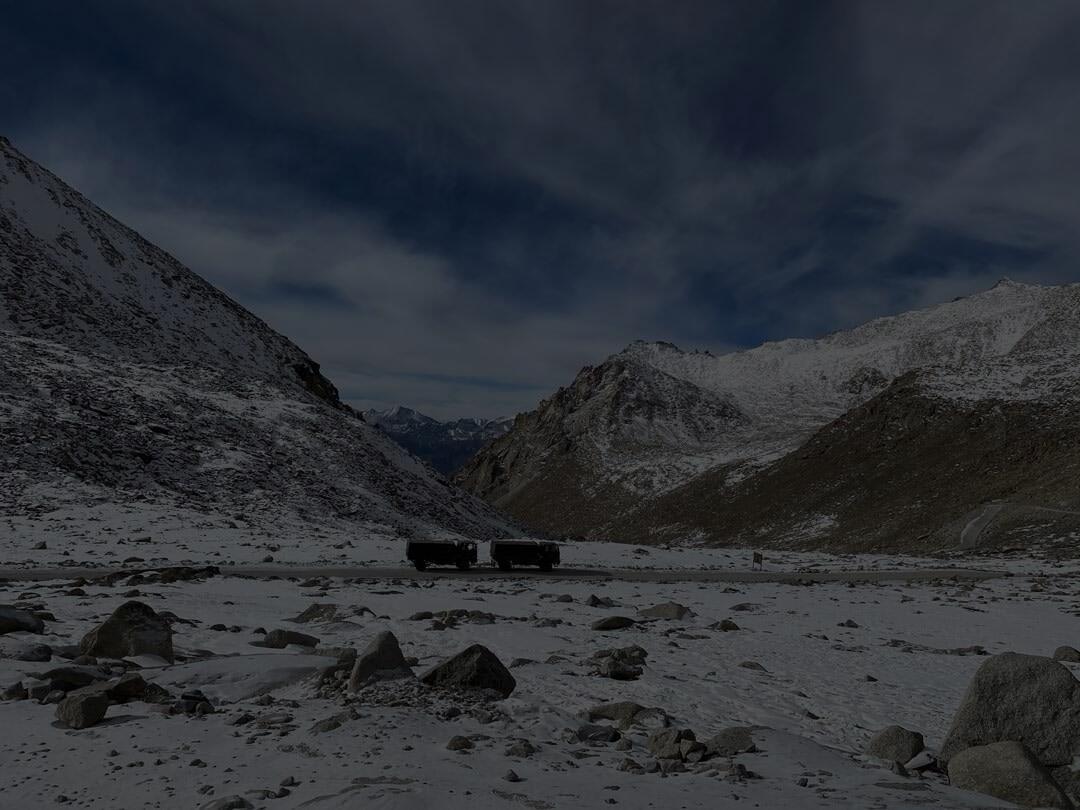
Nuclear-armed neighbours India and Pakistan have battled three wars in a 77year struggle over Kashmir. But why do they contest the region - and how did this conflict begin?
Kashmir is an ethnically diverse community situated in the Himalayan region of the India-Pakistan border, covering around 86,000 square miles, and renowned for the excellence of its beautiful scenery and snow-capped mountains. The former princely state of Kashmir and Jammu is now one of the world’s most heavily militarised zones.
In 1947, India and Pakistan were granted independence from British rule. As dictated in the Indian Autonomy Act, Kashmir was free to agree to either India or Pakistan. Hari Singh, who had ascended the throne of Kashmir in 1925, was the Maharaja (local reigning monarch) in 1947 after British rule. Singh was a Hindu and initially sought independence from both India and Pakistan, frustrated by a lack of political representation during British rule. The population of Kashmir, according to a 1941 census, was 2,997,000 (75.97%) Muslim, 808,000 (20.48%) Hindu, and 55,000 (1.39%) Sikh. Kashmir also shares a border with Pakistan, though it is connected to India through Punjab. Therefore, when the British advocated that princely states join the country of the majority religion, it was expected that Kashmir would accede to Pakistan.
When Singh hesitated to join Pakistan and instead pursued independence, Pakistani herdsmen launched a guerrilla onslaught meant to frighten him into submission. However, instead of helping Pakistan win the territory, the Maharaja appealed to India for assistance, and the governorgeneral agreed to assist on the condition that Kashmir would accede to India. Indian soldiers entered Kashmir and drove the Pakistani-sponsored rebels from all but a small section of the state. India then took over the defence of the region, launching the Indo-Pakistani War of 1947-48.
Both countries refused to withdraw their troops from the region and the First IndoPakistan War left Kashmir divided between the Pakistani “Azad (Free) Kashmir” and the Indian “JammuKashmir”. From the Indian perspective, Jammu-Kashmir had legally acceded to India and the Pakistani government’s support of insurgency and military invasion were hostile acts towards India. From the Pakistani viewpoint, Kashmir was rightfully the territory of Pakistan due to the Muslim majority of Kashmiri people.
UN mediation brought the conflict to a ceasefire at the end of 1948. In July 1949, the Karachi Agreement established a ceasefire line (also known as the “Line of Control”) and demanded a referendum be held, where the Kashmiri people could decide which country to join.
This vote was never held, and tensions between the two nations only worsened after 1949. For example, in a Constituent Assembly Election in 1951, the angered Pakistan Muslim League boycotted the election in Kashmir. This led to India claiming the seat and therefore attempting to declare Jammu-Kashmir, led by Sheikh Abdullah, as a state of India.
The region remained heavily guarded and Pakistani President Ayub Khan (1958-69) sought international alliances to give Pakistan military and economic resilience against the Indian threat over Kashmir. In 1954, Pakistan looked to the United States and joined SEATO (Southeast Asia Treaty Organization). SEATO was a collective defence treaty signed in 1954 that involved the United States, France, Great Britain, New Zealand, Australia, the Philippines, Thailand and Pakistan. Despite hopes that the US would apply pressure to India on the issue of Kashmir, the West were not keen to become involved in the heated conflict, instead sending $700m of military aid to Pakistan. Feeling betrayed by the United States’ refusal to help, Khan turned to China and the USSR. In 1964, China supported Pakistan’s claim to Kashmir and the USSR withdrew support for India over Kashmir in the UN. International alliances and economic development strengthened Pakistan’s government against India, which had recently fought the Indo-China War (1962).
In August 1965, the Pakistani Army planned and executed Operation Gibraltar. The strategy was to covertly cross the Line of Control, pretending to be local and then incite the Muslim-majority Kashmiri population to rebel against the Indian Government. A rebellion (sparked by Operation Gibraltar) by the local Kashmiri population against Indian authorities would serve as Pakistan's case of war
against India on the international stage. Unfortunately for Pakistan, this resulted in a devastating failure for Pakistan. Poor communication and a lack of support from the Kashmiri people triggered the Second Indo-Pakistan War (1965). It led to a harsh criticism of the entirety of Pakistan on the international stage, opposite to the offensive’s intended effect.
After 23 days of intense fighting, the conflict drew to a close and the issue of Kashmir remained unsolved.
The third Indo-Pakistan War (1971) was focused on the issue of East Pakistan, rather than Kashmir. For both countries, the focus shifted to the liberation of East Pakistan (now Bangladesh). In the aftermath, the Simla Agreement (1972) was signed to re-establish the Line of Control and prevent future conflict in Kashmir.
However, by 1987, the situation in Kashmir worsened. It was alleged that India had rigged a key Kashmiri election. Despite this being common, the Kashmiri people decided to rebel. The leader of the pro-India National Conference Party, led by Farooq Abdullah, took control of Kashmir and said “I am not saying that the elections were not rigged. But I didn’t rig them.”
Over the course of the following years, Kashmiris began to join separatist movements in Kashmir, especially the disillusioned younger generation. The largest group, the Jammu and Kashmir Liberation Front (JKLF), wanted an independent Kashmir, in conflict with the interests of both the Indian and Pakistani governments. India perceived these upsurges as violent threats and acts of terrorism. The government put down the protests with brutal resistance, as demonstrated at the Gawkadal Bridge
Massacre (1990). The fighting was exacerbated by the involvement of radical pro-Pakistan fighters returning from the Afghan War.
By 1998, both India and Pakistan had both pronounced themselves to be atomic powers. Despite a recommitment to the LOC in 1999, Pakistani soldiers crossed the line of control later that year, sparking the Kargil War. Fearing large-scale escalation in military conflict, the US quickly applied diplomatic pressure on Pakistan to withdraw forces from remaining Indian territory. Faced with the possibility of international isolation, the already fragile Pakistani economy was weakened further. The morale of Pakistani forces declined and its Northern Light Infantry suffered heavy casualties. Embarrassed by the defeat, Pakistan initially did not acknowledge many of its casualties, but later confirmed 4,000 Pakistani casualties. The war was a major military defeat for the Pakistani Army.
Nowadays, Delhi and Islamabad both claim Kashmir in full, but control only certain regions known as "Indian-
administered Kashmir" and "Pakistanadministered Kashmir". India continues to blame Pakistan for the turmoil by backing separatist activists in Indian-administered Kashmir, whilst Pakistan reinforces its historic, religious claim over the entirety of Kashmir. India has blamed Pakistan for several terrorist attacks both within and outside of Kashmir, including the New Delhi Parliament Building Bombing (December 2001), which killed 14, and the Mumbai terrorist attack (2008) where 170 were killed, and 300 were wounded. These allegations were vehemently denied by Pakistan. India has also been criticised for its tight control over the region and blamed for killing unarmed peaceful protestors in Kashmir.
Today, both sides remain in gridlock over the future of Kashmir. Since a military standoff in 2001, 500,000–700,000 Indian soldiers and 300,000-400,000 Pakistani soldiers have stood along the Line of Control, making Kashmir one of the world’s most heavily militarised borders.
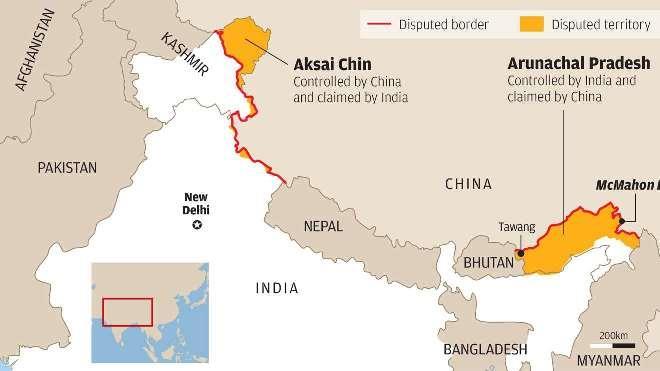

The Vietnam War started on November 1st, 1955, and ended on April 30th,1975, one of the longest wars, lasting nearly 20 years. It was between the communist North Vietnam and capitalist South Vietnam. It ended when North Vietnam captured Saigon, the capital of South Vietnam, an event commonly known as “The Fall of Saigon”. North Vietnam was backed by other communist countries like the Soviet Union, China, and other countries from Eastern Europe. South Vietnam was backed by United States, which was heavily involved with the war and sent a total of 500,000 troops from Australia, South Korea (who sent over 50,000 troops), Thailand, Philippines, and New Zealand. In the war, North Vietnam were led by three different leaders: Ho Chi Minh, who started the war until he died in 1969; Le Duan and Vo Nguyen Giap, the military strategist who played the most important rule in capturing Saigon, planning, and beating the
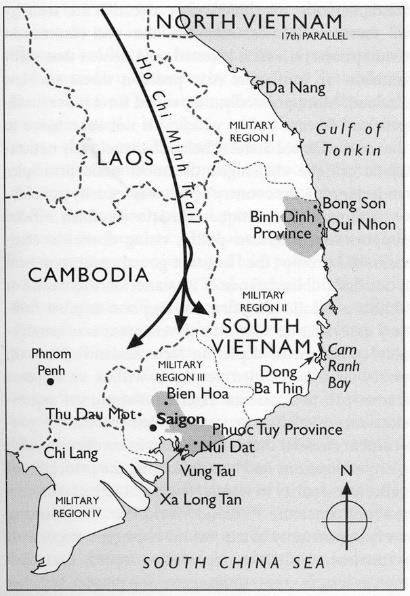
South. South Vietnam were led by three leaders throughout the war. Firstly, Ngo Dinh Diem who ruled from 1955-1963, until he was assassinated (with help from the US, as they thought he wasn’t good enough to lead South Vietnam) after facing heavy criticism. Then, Ngyuyen Cao Ky, who ruled from 1965 to 1967 and served as vice president under the next leader, President Nguyen Van Thieu, who served as leader from 1967 to 1975, until the Fall of Saigon. One of the main wars that led to the Vietnam War was the First Indochina War, which lasted from 1946-1954, when Vietnam was first divided into North and South. Therefore, Dinh Diem was made minister with the help of the US to mark a new government for the Southern people. During the war, the Gulf of Tonkin incident in 1964 was one of the most essential parts of escalating the war as it gave way too many more US troops, which increased the military involvement significantly.
One of the main reasons South Vietnam lost was because the US, by the mid1960s reduced their involvement in the war, and officially left the war in 1973. There were many reasons for this, such as domestic protests. Many Americans were strongly against the war, and many riots and protests took place
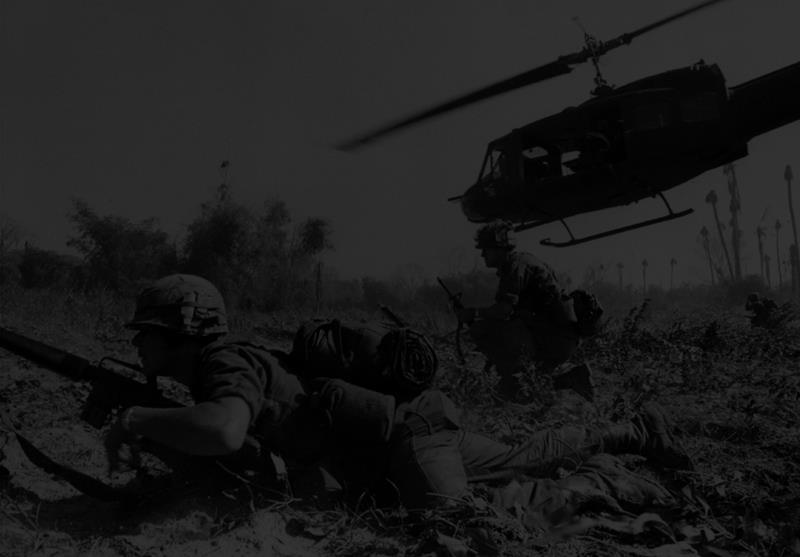
against the war, which pressured the government to end involvement. It was also financially a struggle for them, as billions of dollars went to support the South, and the death toll for American soldiers was increasing heavily. There were frequent changes with the South in terms of government, and the US found it difficult to co-operate with them as they weren’t stable or effective in their rule. Additionally, there was limited progress being made as the North had such powerful allies in the form of the Soviet Union and China. Many attempts were made to end the war, and the Paris Peace Accord was signed in 1973, which was when America stepped out. However, they sent some economic and military aid, but much less than before.
There were many reasons North Vietnam won the war, for example their leadership was strong, and the presidents were all united with their allies, which crafted a clear way for victory over the South. China stood out amongst the allies over the North as they offered plenty of economic help to the North so that they could buy and use modern war machines to fight against the South, particularly America. The news of China itself joining alerted the South Vietnamese that the war could escalate significantly, or even turn into a World War due to China’s status as a strong communist country. The Soviet Union also contributed greatly to the win, with their military aid consisting of tanks, artillery and
aircrafts which helped defend against bombing. They also brought along experts, to help improve their combat skill and taught them how to use the tanks. The North’s allies were not directly rewarded, but they were given an opportunity, especially important for the Soviets, to beat the Americans as they lost the Cold War. They also increased their influence in South-East Asia, allowing communism to spread further.
All in all, after North Vietnam captured Saigon, Vietnam was reunited as one communist country again. However, the aftermath of the war was awful, resulting in millions of deaths. It also caused many South Vietnamese refugees to escape as there was war and death all around them, with no true safe place in the country. Immediately, Vietnam set out to repair $168 Billion worth of damage, which is $1 trillion in today’s money! It greatly impacted America, politically as it completely flipped the way they look at war and left a permanent mark on them. Gradually, the country began to lose faith in their government and questioned everything they did. In the end, the United States attempted to normalise things with Vietnam, and the process first started with the establishment of diplomatic relations with the Vietnamese government in 1995. This was the start of the healing between the two nations.

Saudi Arabia is the largest nation in the Arabian Peninsula, covering a large portion of the Arabian desert. It is an absolute monarchy, with its laws governing its political system, which is mainly based on the Islamic principles of Shariah law. The king serves as head of state and head of government, which allows him to further yield significant executive powers. Additionally, the formation of the Allegiance Council established in 2007 plays a key role in integrating the smooth transition of succession, which allows the Saudi royal family to build the basis of control in the country’s political system and reduce the chances of other parties taking over.
Saudi Arabia has been hit with many controversies, such as human rights issues, including concern for arbitrary detention, restrictions on freedom, and the poor treatment of political dissidents. Examples include the case of

Jamal Khashoggi, a Saudi journalist and Washington Post columnist who was killed in the Saudi consulate in Istanbul. This event truly highlighted the kingdom’s involvement in the removal of people who spoke badly about the nation. This, as a result, sparked global condemnation, which was just a stepping stone for the downfall of Saudi Arabia's global political reputation.
Likewise, capital punishment and execution rates are leading controversies as Saudi Arabia has one of the highest execution rates globally; the use of death as a penalty is a global spark on the subject of controversy due to the lack of transparency in the defendant's case. Many are manipulated using the media, fake evidence, and propaganda, as the main aim of the government is to sustain these controversies by subduing them with deception.
Moreover, Saudi Arabia continues to face criticism, due to the poor treatment and establishment of the rights of women, by several significant activists. This includes Loujain Alhathoul, who
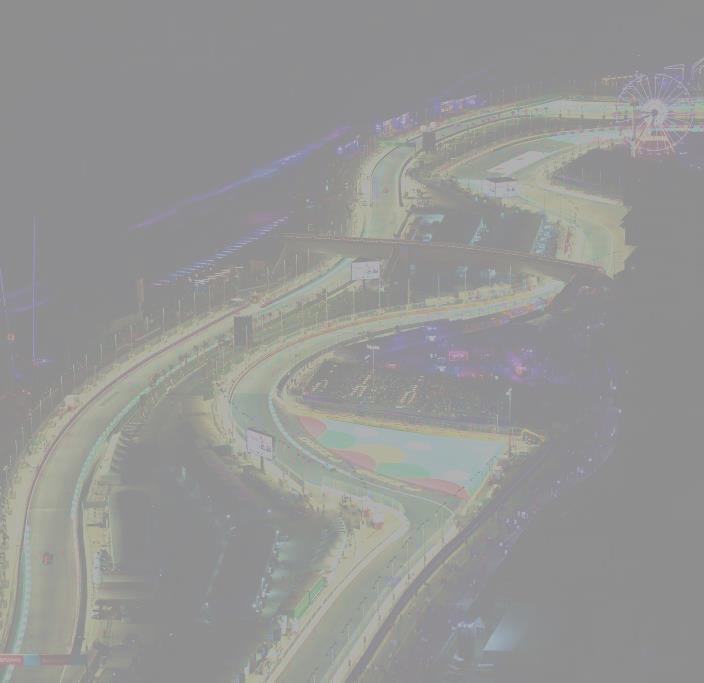
was sentenced to 5 years and 8 months in prison due to her advocacy. The slow removal of the male guardianship system for the man to provide and the woman to look after the children as the traditional roles of both men and women because of the history of Islamic laws strongly depicts the poor effort made to balance this gender equality-forming and has given the Middle East nation an infamous reputation.
Sport washing is the use of sports involving major athletes to improve a country's overall public image, as it can build a sense of national pride within the nation and allow outsiders, tourists, to view the nation as positive and vibrant to accommodate vast communities filled with joy and fun. Sports involve pride, people, popularity, and passion, which can overlook and deflect attention from issues that may attract criticism.
Saudi Arabia uses three main factors to use sports as a cloak for its controversies: global image enhancement, distraction from its human rights abuse, and showcasing social and economic reforms.
Global image enhancement allows Saudi Arabia to shift its common stereotypes of an oil-rich nation filled
with human rights abuses and inequality. The billion-dollar investment in sports such as football with the signing of the CR7 into Al Nasr and in F1 with the Saudi Arabian Grand Prix and becoming the sole title sponsor of Aston Martin F1 with Aramco allows Saudi Arabia to project a positive modern image to the global stage and establish its capabilities of organising and hosting international events. This then therefore diverts attention from continuous domestic issues to flashy, luxurious cars and hotels filled with celebrities and athletes
Saudi Arabia is faced with substantial international criticism for its human rights record, restrictions on the freedom of women, and the murder of Jamal Khashoggi. Actively partaking in sports allows the government to shift the narrative perspective away from these human rights. This entertainment boosts the value of positive modern gentrification.
These reforms allow Arabia to modernise and adapt to these different times, drawing attention away from its history. The recent government intervention of “Vision 2030," with the establishment of women being able to attend sports, is a leading example of Saudi Arabia trying to portray itself as a nation with progressive transformation.

‘Trade Wars’ have been going on for centuries, however none have been as influential to our lives as the China –USA Trade War. Its effects extend not only to China, where workers have lost their jobs and economic growth has significantly staggered, but to the whole world, where cheap supply chains had to be reconfigured and global economy disrupted, redefining the entire geopolitical system.
The ‘Trade war’ began in early 2018, when recently elected Donald Trump placed tariffs (higher taxes on imports from certain countries) on certain Chinese imports, claiming that they used unfair trade practices and intellectual property theft. China then retaliated with more tariffs on key USA imports such as soybeans and pork. Over time these tariffs increased in intensity. A main reason for Donald Trump’s action was the taking over of the global market by China. In 2000, China was the biggest supplier to few countries. Following its entry into the World Trade Organisation (WTO), most of the world, save a few south American countries, were importing mainly from China. This extended to the USA, which had racked up a total of 179 billion USD compared to China’s 558 billion USD in the two’s 737 billion USD goods
and services trade between one another, according to the U.S Trade Representative. Obviously, there is a huge trade imbalance between exports and imports for the USA. For Donald Trump this meant harsh and heavy tariffs to ‘equalise’ the market. Almost 6 years in, and we can’t see the benefits Trump promised. However, it has changed the global commercial landscape, disrupting supply chains and political relationships.
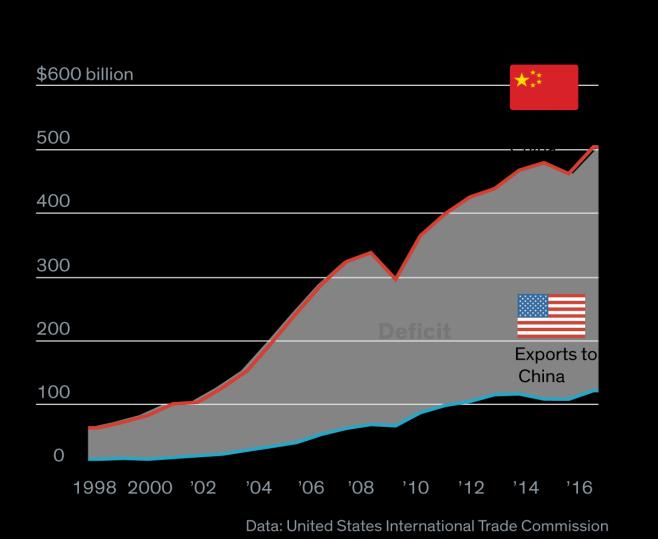
In the USA, tariffs had significant impacts. For example, the strategic Chinese tariffs on key American imports have damaged U.S agricultural firms. Studies showed that there would’ve been no growth in the agricultural incomes in 2019 if it had not been for federal assistance. Even with this assistance, there has been an increase in debt and bankruptcy, and a decrease in
solvency (ability for company to meet long term debts and obligations). This is seen by Rick Kimberly, a soybean farmer in the U.S, which has deep roots with China. President Xi personally told Rick that he will use their farm as, “a model of modern agriculture,” in China, leading to a U.S-China demonstration farm in Hebei Province. Kimberly himself has been to China 20 times and has built a steady relationship with it. The trade war caused the retaliation tariff of 25% on soybean imports, and, with China, buying 60% of world’s exportable soybeans and the US being the largest exporter of soybeans in the world, many farmers were financially affected. Many went bankrupt, and most had no profit in the 2019 season, including Kimberly himself. Phase 1 is a plan devised by U.S and China to redevelop the trade relations, however, as of end 2021, the exports of soybeans to China was still below pre trade war levels. Kimberly has stated, “One by itself is not going to
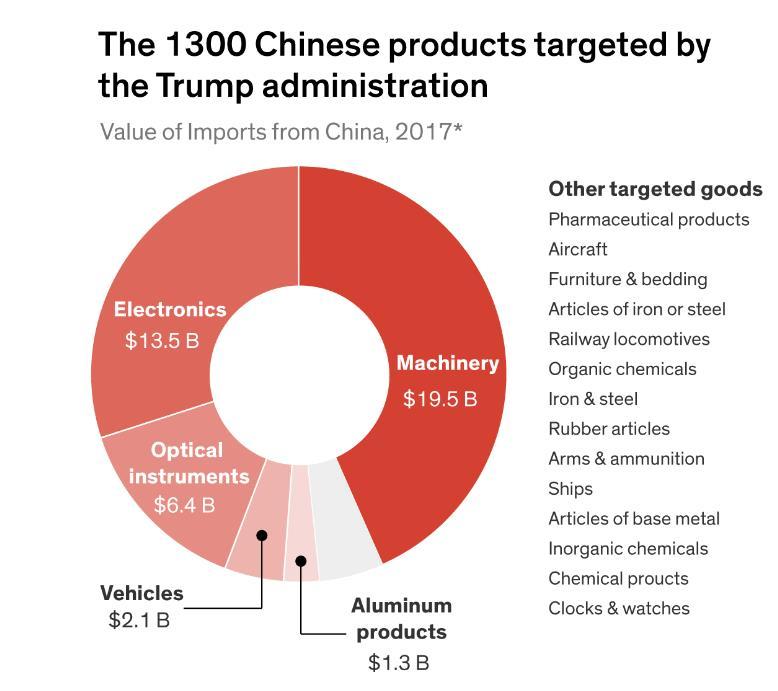
be as strong as both of them working together.”
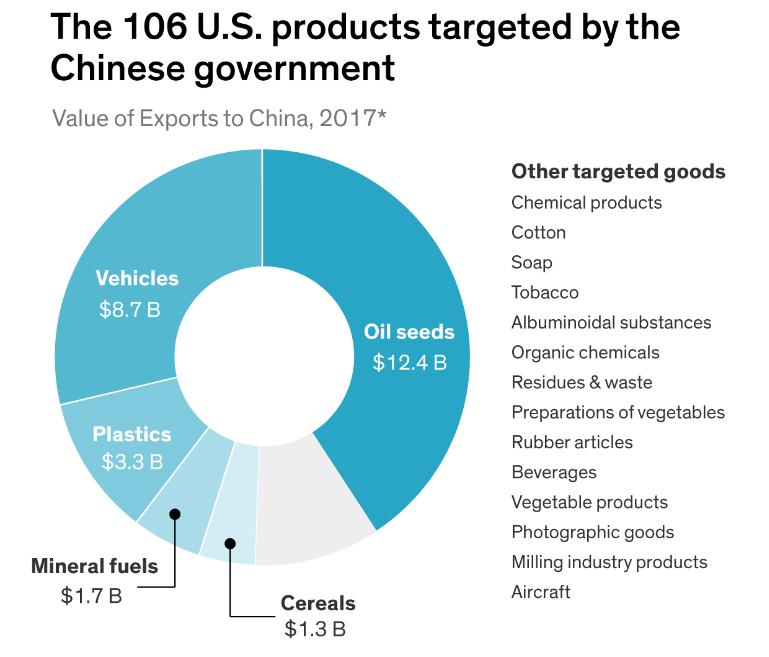
However, the U.S has not only been affected in the agricultural sector. The intense tariffs have forced both China and U.S to rethink their general product market, as it has taken a hard hit. Directly or indirectly, supply chains have been disrupted, and consumer prices and household bills have increased, leading to the disruption of jobs. This is because of the intertwined relationship of the two countries. Initially, before the opening of Chinese markets, the U.S manufacturing industry in the ‘flyover country’, the centre of USA, gave the workforce for businesses. After the globalisation of the U.S, those jobs were lost to cheaper sources in China. Even so, American businesses reduced their manufacturing cost by 10-12% between 2000-2006, which reduced the prices of their products and increasing household bills. For example, Energy Independent Solutions, who manufacture solar
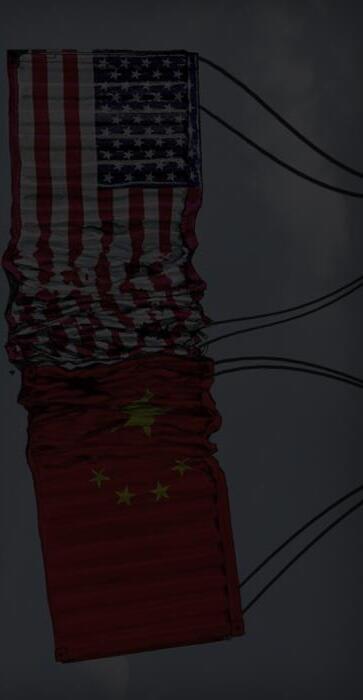
devices, saw their prices of solar modules drop to one-eighth of the price – due to Chinese manufacturing. As a result, 2016 was the first-year solar panels became a cheaper option for energy than fossil fuels, and there was hope that the U.S might finally end its dependence on fossil fuels. However, because of the ‘trade war’ , solar panels were hit with a 30% tariff, leading to 62,000 jobs being shed as a result of energy plant deals being discarded.
In China, the joining of the World Trade Organization (WTO) and the opening of their economy to the world in 2001 meant that 40 million stateowned enterprise workers were laid off. During the ‘trade war’, Chinese manufacturing businesses (that had originally catered to big western brands and the U.S) began to expand to their own country’s market; a new kind of economic growth strategy was built: Dual Circulation. It means that China’s markets are moving away from export-led growth and are focusing now on domestic growth (the inner circulation), such as consumption, technology, and urbanisation; the outer circulation is China’s relationship with the rest of the world. Looking forward, only about 4% of Chinese companies are
looking to restart their partnerships in the U.S. and big brands such as Hasbro and Nintendo are starting factories in India, Mexico, and Vietnam.
As we try to find potential solutions to the still-ongoing ‘trade war’, we can see that a complete decoupling (eliminating of the trade relationship) between China and the U.S is impossible. Scott Kennedy (of the Chinese Business and Economics centre) said, “the idea we (USA) will weaken them (China) or make us safer is not likely to occur.” So, serious second Cold War is out of the question, especially with 60-70% of products in Costco and Walmart being produced in China.
Demonstrating this further, the U.S–China Business Council stated that 83% of the 200 companies in it counted China as, “the top or among the top five priorities for their company's global strategy.” Looking into the future, it’s clear a diplomatic way of resolution is needed, especially with such intertwined nations. Until then, we will have to watch and try to negotiate the effects of job losses, rises in household bills and the tensions rising in the White House and the CCP.

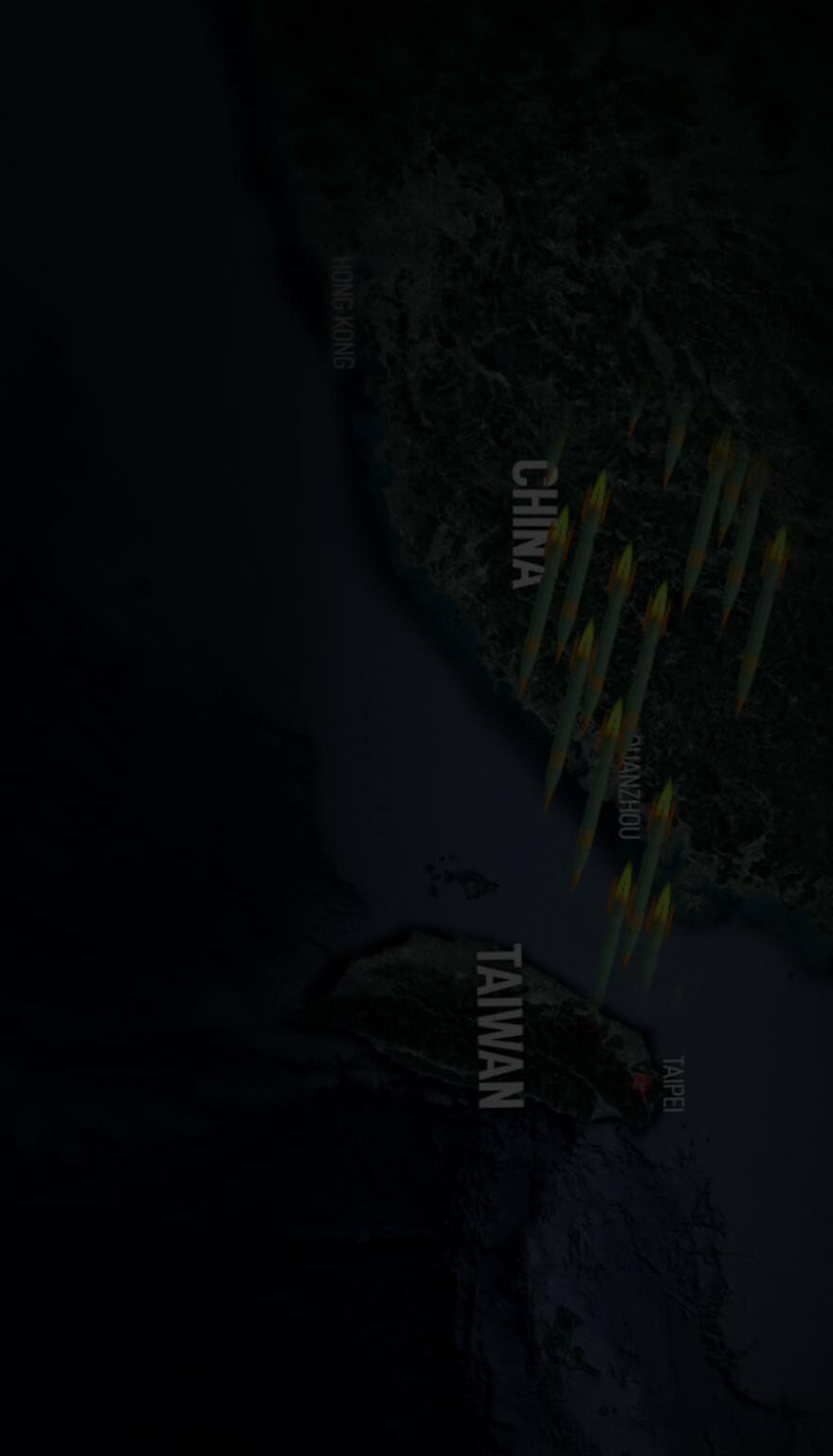
Roughly 100 miles off the coast of mainland China lies an island slightly smaller than the Netherlands, with a population of 23.57 million people. While it may seem insignificant at first, Taiwan is disputed between the People’s Republic of China (The Government of Mainland China) and the Republic of China (The Government of Taiwan). This dispute is only the tip of the iceberg in a battle of ideals, a battle of 2 dominant world powers, a battle of the Pacific Ocean as a whole.
So how did we get here? In 1912 the Republic of China was set up in China after the Xinhai Revolution of 1911 bought an end to 2000 years of imperial rule. By 1927, the republic had plunged into civil war between the nationalist government and the Red Army of the Communist Party. Hostilities halted during WW2 as China fought against Japan, but after this the two sides fought each other once again until the victory of the Communists in 1949 as communist leader Mao Zedong proclaimed the founding of the People’s Republic of China on 1st October with its capital in Beijing. The nationalist forces,
led by Chiang Kai-shek, retreated to Taiwan, as the new PROC crushed remaining forces on the mainland. Communist forces attacked Taiwan in the Battle of Guningtou, but failed, and thus set the scene for over 70 years and counting of conflict. Soon after, Chiang proclaimed Taipei as the temporary capital of the ROC, while still asserting his government as the sole legitimate rulers of China proper. Realistically, though, he had no control over anywhere other than Taiwan, as with the capturing of the Wanshan Islands in August 1950, the PROC had total control.
In the beginning, Western governments recognised only the ROC, but the tides would soon turn. Britain recognised the PROC in 1960 and this prompted many to do the same. In 1971, despite being a founding member, the ROC was expelled from the United Nations in favour of the PROC. As of 21st April 2023, the only nations that recognise Taiwan as a country are Marshall Islands, Eswatini, Paraguay, Nauru, Palau, Vatican City, Saint Lucia, Saint Vincent and the Grenadines, Guatemala, Haiti, Belize, Tuvalu,
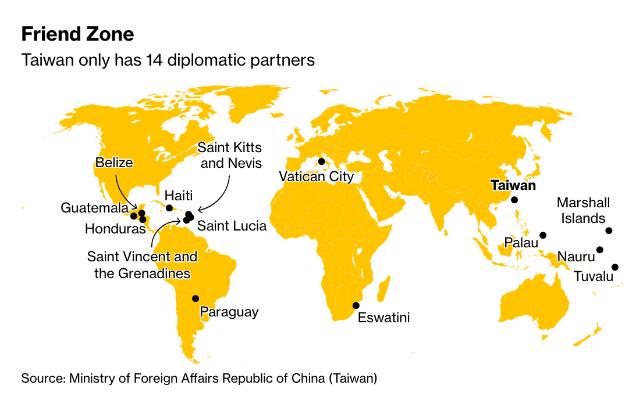
and St Kitts and Nevis. 13 insignificant nations, most so insignificant that China doesn’t care. Everyone recognises China apart from Taiwan and Bhutan, who, strangely, have never recognised the ROC or PROC. While countries like the USA, UK and other nations aligned with them publicly support Taiwan, they operate on a “One China Policy”, and besides, recognition of Taiwan would almost certainly end any element of trade one has with China, which no major power is ready for.
China nowadays is a huge world power. By far the most powerful communist nation left, with the 2nd biggest GDP at over 14 trillion US$ and set to overtake 1st place USA this century. It is a leading exporter in, to name but a few things, electrical machinery, computers, furniture, military equipment, and vehicles. In 2021 it made over 3 trillion US$ in exports, making it the world’s biggest exporter. Most NATO members are reliant on these exports and can’t afford to lose them. Thus, for the foreseeable
future, the West may show support to Taiwan, but never recognise it. So, what if war does happen? While it remains unlikely, China recently did simulate missile strikes on the island, perhaps some unsubtle foreshadowing. The USA has said that it would come to Taiwan’s defence, perhaps part of the reason why China has never invaded Taiwan since the civil war. I have already mentioned China’s massive economic influence, and whether China turns off the tap or American allies bring it upon themselves, the impact would be huge. Taiwan is a major exporter of superconductors, and there would be a worldwide shortage in this scenario. But this is not just about Taiwan; it is also about two superpowers maintaining their pride. China is an authoritarian regime, meaning that the government has a huge part in people’s lives, and the government enforces strict obedience on the people. It is also a communist country, run by the CCP. While democracy does exist, it is only on a local scale, and the CCP controls the country. On the other hand, the USA is a democracy, though on the democracy scale it is ranked as a flawed democracy. The US has always hated communism, after all, much of the latter part of the 20th century were spent trying to fund rebellions to topple the Soviet Union. The two have been battling
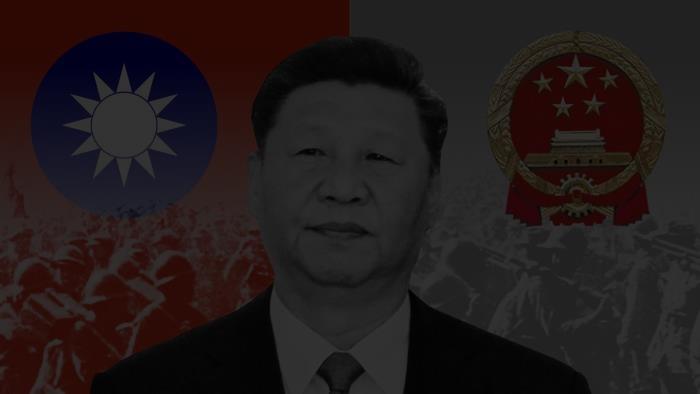
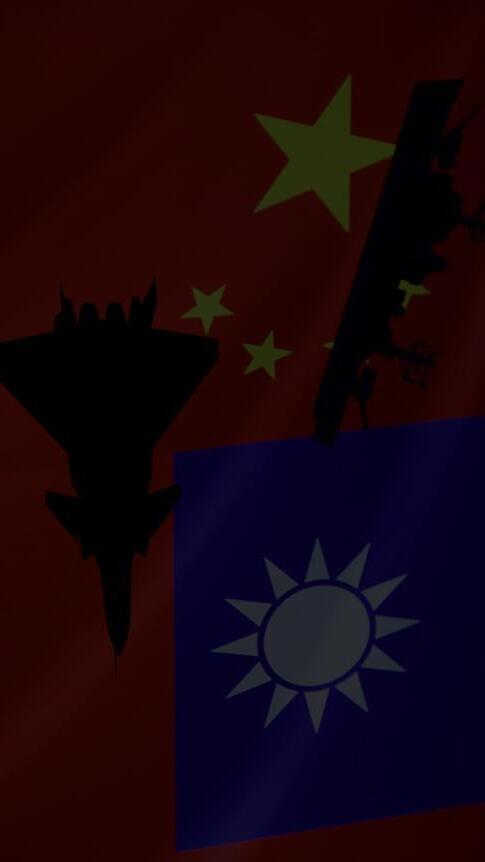
over the pacific, with angry messages and demonstrations of military power as they try to win over the pacific nations.
It all boils down to Taiwan, but the conflicts spread way further. Of course, we have the Korean Peninsula. It has been divided between the Democratic People’s Republic of Korea in the north (In fact one of the least democratic nations in the world), and the Republic of Korea in the south. Nowadays, the DPRK is infamous for the dictatorship of the Kim family, the mass famines and poverty, and the intrusive nuclear tests that could soon reach the USA. The south is incredibly modern, an example of modern democracy and home to huge companies like LG, Samsung, Hyundai and more. But it may surprise you that it used to similarly be a dictatorship, but under capitalism. The North aligns with China and the South with the US, as does Japan, which is now one of the closest American allies, a huge economy and regional power. Australia and New Zealand are also aligned with the US, and are both members of Five Eyes, one of the leading world intelligence sharing communities in the world – The USA, Canada, UK, New Zealand and Australia. Extensions of this include Nine Eyes, which also includes France, Norway, The Netherlands and Denmark, and 15
eyes, which has even more members.
Africa is also a point of interest to both the USA and China. Both sides have been battling to win over the nations on the continent. China is Africa’s largest 2-way trade partner, and Chinese business and influence is abundant. In Ethiopia, the Chinese are building a major railway line across Ethiopia’s challenging geography, for example. Some natives are critical of this, saying that the Chinese don’t care about human rights. The USA and NATO also have influence, and routinely intervene in African conflicts, for example in Libya and The Sahel (The band of Savanah south of the Sahara including countries such as Mali and Burkina Faso), which has also drawn criticism.
One thing is for certain though. Neither state will back down. China and the USA will stand their ground, knowing full well that submission to the other would put Taiwan in a position that it doesn’t want. On 26th March 2023, Honduras stopped recognising Taiwan and began recognising China, causing outrage in Taiwan. Will our grandchildren learn about the “Pacific Cold War”? Now war is more dangerous than ever, with modern weapons and the dreaded Nuclear Bomb. Move over, Berlin – Now our eyes must go eastwards.

As an Old Olavian, what values have you learnt from St Olave’s that have shaped you career?
I was not very aware of the world around me at that age. In fact, I was a part of quite a rebellious group, with my hair down to my collar until 6th form when I decided to cut it all off! But the serious answer to the question is hard work. The idea of meritocracy; If you do work hard and apply yourself, you get rewards not based on factors such as who you were and your background. I think this realisation had quite a profound effect on my political values. As well as this, teamwork. We started playing football here and were the first year to do so, and it was that teamwork I enjoyed in football and getting into the semi-finals of the Kent cup in Rugby being a particular highlight that demonstrated teamwork. I will never forget that.
So, what inspired you to go from St Olave’s to go into Politics? Was politics always your dream career?
Well, as I was saying when I was back in the chapel, we had a band and we used to be in the chapel. I was paving the way to be a pop star. We did get to number 4 in the independent charts back in 1991. We were all at school at that time, but I don’t think we ever harboured a serious ambition or belief that we would make, but we had great fun doing it. You can google
‘Greenfield leisure’ to watch the botched attempt we made to be a pop group!
But to answer your question, no. I got a job at Chester Football club, another one of my passions, between leaving school and gong to university as assistant secretary at the football club. I thought it was an office job. But then the chairman took me to one side and said we think you can be the next secretary of the club, which would have been a dream job for me at the time. Then I had to make the hard decision; do I pack it in and go to university, or do I take this dream job. I made the right decision. I went to university, as politics was drawing me. In the end, it proved to be the right decision as 18 months later, there was a complete clear out of the football club and I would have been sacked. Football, like politics, can be brutal. What do you think is your fondest memory of being at St Olave’s?
We had great fun. And, if I could be slightly irreverent, we decided to start an alternative school magazine. We called It ‘phlegm’. The Headteacher, Mr Colson, got to hear about this and we

were called into his office. I can vividly remember us sitting in the office, the four of us seriously trying to argue we were not trying to refer to a kind of cough, but instead a reference to being phlegmatic and reflective. Anyway, we ended up changing it to be called ‘Antidote’. That was a fond memory.
We also started the school ‘rag week’, that was brilliant. We did things including a quiz where teachers would choose specialist subjects. My favourite teacher, who was very generous and kind to me, was Dennis Wiseman. He was a real mentor to me; he saw something in me that I did not see in myself. He was one of the teachers we publicly lampooned in this rag week quiz.
The most truthful answer, I think, however, is the friends we made for life. I still see about 12 to 15 of my friends who were here. We meet every year in a pub, second Friday of July without talking beforehand. That is brilliant. For all of us, it has kept some sort of contact with the school.
What is the best advice you would give to students who want to go into politics, or study PPE?
I would say dive in. Try it. Particularly if you are thinking of studying it, do it before you take up the subject. All major political parties have youth wings. Pick the one that is closest to what you believe and try it. It will tell you whether politics is for you. If you are interested in the practice of politics, there is nothing better than trying it, because if you are not passionate about it wherever you’re coming from, the left, the right, the centre, then I don’t think it will be for you. There is nothing like politics in terms of the reward you feel, from campaigning in elections to winning 300 votes. Nothing like it at all.
Why do you think it is so important for us, as young people, to be involved in politics?
It is absolutely essential. Politics is about power. If young people are not represented in political discourse, then your interests won’t be adequately represented, as only you can make people understand where you are coming from and only you can get people to understand your perception. That’s the beauty of a democracy. You have the opportunity to voice yourself. That is why I have always supported the self-organisation of underrepresented groups of all types. One of the proudest things I did when I was working for my company, between working for the labour party, was when we were asked to do a piece of work for the local authority in Middlesbrough who voted to have an elected mayor as opposed to a ceremonial mayor- which most mayors are. And we came up with the idea of a directly elected young mayor to sit with the elected mayor in order to be a voice for young people in decision making. And now there are now around 20 or 30 directly elected young mayors-with the nearest one to here being Lewisham.
After running a cross party consultancy firm from 2002 onwards, how has your opinion in terms of politics, economics changed?
Two or three respects, I think. Firstly, it gave me the opportunity to work with local authorities and councils run by Conservatives, Labour and Liberal Democrats. I gained enhanced respect for others in political parties. They were all genuine and all wanted to do the right thing, despite wanting to achieve these aims in different ways. It also gave me much greater insight into business. There is nothing like waking up in the middle of the night worrying about how you are

going to meet the wage bill or having to put your house up as collateral to secure the future of the business. One of the things I have tried to take back to the labour party is the need to understand and hear small businesses, who take risks in order to create wealth. I don’t think I would be as good at spreading that influence, if I hadn’t experienced it.
What has you career so far taught you about the skills that you need to stand out and be a successful politician?
The absolute key is to be yourself. We like to think that we are sophisticated as 21st century human beings, but we are all quite primal beings. As politicians, we want to understand somebody’s motive and what their story is. And it’s essential for a politician to be themselves otherwise a voter won’t be able to articulate what they want to say. The best politicians are the ones that are most authentic. You have to be consistent as well. Trust is hard won; you have to do the hard yards over a long period for time to gain trust. The final thing I would say is empathy. I go door knocking at least once a fortnight and I know that most people are decent. Opinions aside, most people will chat with you and the best politicians will understand where people are coming from, they have natural empathy.
Is there one specific thing you would do in the runup to the 2024 general election that would make you stand out from the government and seal the approval of the voters?
That is where it all hangs. If we cannot seal approval of the voters and bring something fresh to the table, what is the point of voting for someone when there’s greater risk in making change? Change can be more dangerous than continuity, and it is in our interest to make change. There
will only be about 150,000 voters who will determine the next GE. Because of our electoral system, we need to win around 135 seats, a fifth of the seats available. Within those seats, with electorates of 70,000, only 80% will vote. There will be a block, say 15,000 who will always vote conservative and a block who will always vote labour, so around 10,000 in each seat who votes are in play, one way or another. So, our ruthless target is to identify who those voters are and get to know them. Get them to trust us by listening to them and building a relationship. That is the game. The fundamental thing we have to do is seem competent, acting on security, safety, defence, borders and economic safeguarding. And I think we have a better chance than ever. Looking over the last 13 years, it is difficult to point at what has actually improved. If you look at the last labour government, which may not have been perfect by any means, there are still a whole range of improvements made. But we mustn’t fall in the trap of fighting the last election instead of the next one. The primary thing we need to do is to win the argument that the economy will grow better under Labour then the Conservatives. We believe the recipe for growing the economy in a sustainable way is to make the economy fair, building growth without inequality. It is just like the war. We won the war, and Winston Churchill led us to victory, so in the 1945 general election many people thought he would win. What happened? The people voted labour. Why did they do that? Because they don’t vote to say thank you. They vote for what’s coming next. The war had brought immense hardships, and the people wanted and deserved better. We have to make a 21st century argument like that. Because we deserve better, and labour can bring that.
How has your work personally within the labour party positively impacted your party and also the UK?
It is more exciting to work for a political party in opposition than it is in government, and that is the honest truth. When you are in government, everybody runs off to government, whereas when you are in opposition you are attacking. Attacking to try and get into power. I like to believe I played a small but important part in turning the Labour Party, pre-1997, into an election winning machine when I was assistant general secretary, that led to the benefits of a labour government such as minimum wages, civil partnerships, cutting poverty and creating a fairer country, more equal country. But now, that I have been general secretary for nearly three years, I would like to believe I have been playing a rather bigger role in this part; but ultimately it is an electable team driving labour. Sometimes, I think governments run out of steam. And I think this government has, so the time for change is now
What is the proudest part of your career?
As I said, 1997. I was regional director in the North of England, and there we won 25 gains in the Northwest. My business was also making a difference in various parts of the country, such as making local council, charities, health services more responsive to need and involving people more fully in designing these responses. And now, every morning I wake up and think that I am the general secretary of the labour party. And that is an immense privilege.
What specific aspects of politics are you most passionate about? What keeps you interested in politics?
I think tackling prejudice was what brought me into politics. I cut my political teeth in the 1980s when the very pernicious far-right politics was focused on the national front. I saw my brother, and not just the incident that I described, but the way I saw that he didn’t have a voice. I am still an advocate, a voice for him. A drive for me is making sure that people have a voice, and one aspect of that, I suppose, is social mobility. I still think we are hamstrung by class and other in-built barriers or advantages.
If you had the chance to take any other role in politics, what would it be?
I was a councillor in Croydon for 4 years between 1986 and 1990. And that was enough that told me the elected representative route wasn’t for me. I believe I have much more of a flair and much greater contributions working behind the scenes. Needless to say, that, I do have to give a speech at the Labour party conference and do some sort of public facing.
One final anecdote, I can remember shortly after the 1997 GE, I knew Tony Blair as the leader of the Labour Party. He invited a group of us to Downing Street about membership. I remember coming out of Downing Street thinking ‘Oh my goodness, he is just a bloke’. He doesn’t know everything. This may seem daft, but everybody is flawed, everybody is not perfect and yet he still put himself out there. And I thought, I will do the same thing going forward. And so, to answer the question, no. I have picked the right career path for me.

Anarchism is socialist political movement that advocates for the abolition of centralized systems of power such as hierarchies and governments, in favour of decentralized, self-governing communities. Anarchists believe that anarchism will make one of individual freedom, equality, and cooperation. Even though anarchism is based upon unsuccessful communist theories (in capitalists’ view), the foundational principles seem possible.
Arguments for Anarchism
Anarchism is based on one's perspective and dreams; it talks of how individuals will not be pressured by other and instead follow their own ideas and tastes. We are often pressured by others to follow popular ideas to show we are not “strange” to others. In anarchism, people decide what is what, unlike in the world of capitalism where it is possible to obstruct one’s say, like when Republicans obstructed Merrick Garland’s (US Attorney General) hearings. Also, it is said that in anarchism you get to choose
happiness instead of trying to make your way through the world, day-byday, hoping to catch glimpses of wonder while waiting for a miracle, the answer of all happiness according to anarchists is the abolition of governments. Governments decide laws which hold people back with two mechanisms: Guilt and Shame. These two principles hold people back from their true potential while in anarchism you can do what you want without the looming thought of being punished for an action. Anarchism is wholly based on being your true self without any complications or distraction to stop you getting on with life.

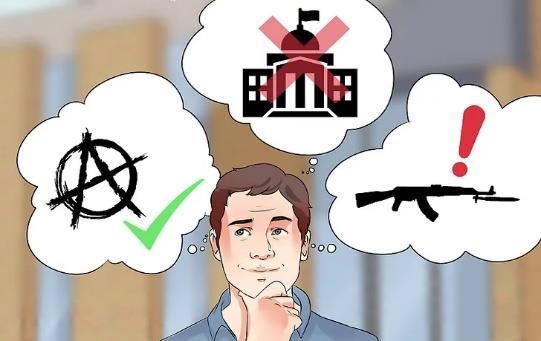
Even though Anarchism has some good arguments for it developing into a modern-day society, the breakdown of modern laws and protection forces (polices, armies etc...) leads a world where deranged maniacs and serial killers roam the streets. Your daily morning shopping could turn into a game of hide and seek with your life on the line or even a bloodbath. The laws and forces are around for our protection. Also, it could prove unsustainable in the long-term, with people choosing what they want to do. Education levels may suffer due to the lack of wanting to do a job; every adult does not want to spend a full day tiring themselves out instead of laziness and relaxation. Anarchism shouldn't be just about one's dreams and goals it should be about everyone
maybe one day you`ll find yourself prepared to make the journey to Sainsbury`s with lunatics, killers and highwaymen prowling on the high street. Sounds like a video game.

So, should Anarchism be around? Maybe if it truly completes its goal. But by today’s standards anarchism seems a little far-fetched, would there not just be chaos? How will the economy be sustained? Will people even follow the principles of Anarchism if there is no law? And yet people still believe it. If you lived in an Anarchist society, would you survive? Charles Darwin`s famous quote “Survival of the Fittest” truly explains what may happen in an Anarchist society. So


Artificial Intelligence (AI) is a field that has captivated human attention for centuries, advancing rapidly and slowly dominating the world of technology, business, and politics. Many billionaires today such as Mark Zuckerberg, Bill Gates, Jensen Huang invest in and love the potential of AI in our society. Others such as Elon Musk aren’t happy about AI, speculating it could take over the world. Only a small (16%) number of British people are optimistic about AI’s potential. So why is AI so controversial? In this article, I will focus on the roots of AI and its rollercoaster journey becoming one of the most controversial topics in modern day politics.
The birth of AI as a scientific field can be traced to the mid-20th century. Alan Turing, a brilliant mathematician, and logician (who discovered the German Enigma code in WW2), laid the theoretical foundation for AI with his groundbreaking work on computation and the Turing machine. His landmark paper, "Computing Machinery and Intelligence" (1950), proposed the famous Turing Test as a base for the creation of AI, dictating what the standards it must meet.
The term "Artificial Intelligence" was produced in 1956 during the Dartmouth Conference, an important event, which marked the official beginning of AI as a recognised field and laid the groundwork for early AI research and development. John McCarthy, Marvin Minsky,
Nathaniel Rochester, and Claude Shannon, among others, worked together to explore the potential of machines that could simulate human intelligence.
The late 1970s and 1980s was hit with a decrease in demand for AI. Funding for AI research dwindled as early promises failed to deliver, and unrealistic expectations led to disappointment. Many projects faced scepticism, and the field struggled to deliver on its ambitious goals. The period they called “The Golden age of AI,” became known as "The AI Winter."
Spark for AI (1980s- early 21st century)
Advancements in neural network research and in machine learning, in the late 80’s and early 90’s reignited interest in AI. Neural networks especially, showed promise in pattern recognition tasks, a key element of AI functioning. However, computational limitations, insufficient data and lack of storage capacity because of primitive technology, which was still evolving, hindered their progress. The early years of the 21st century witnessed massive amounts of data becoming available, and powerful GPUs enabling the training of deep neural networks to improve factors such as pattern recognition, thereby making AI more advanced and less prominent to the average person. This also led to breakthroughs in image and speech recognition, natural language processing, and other AI applications boosting investment from governments such as the US and China. Companies such as Google, Facebook, and OpenAI have played
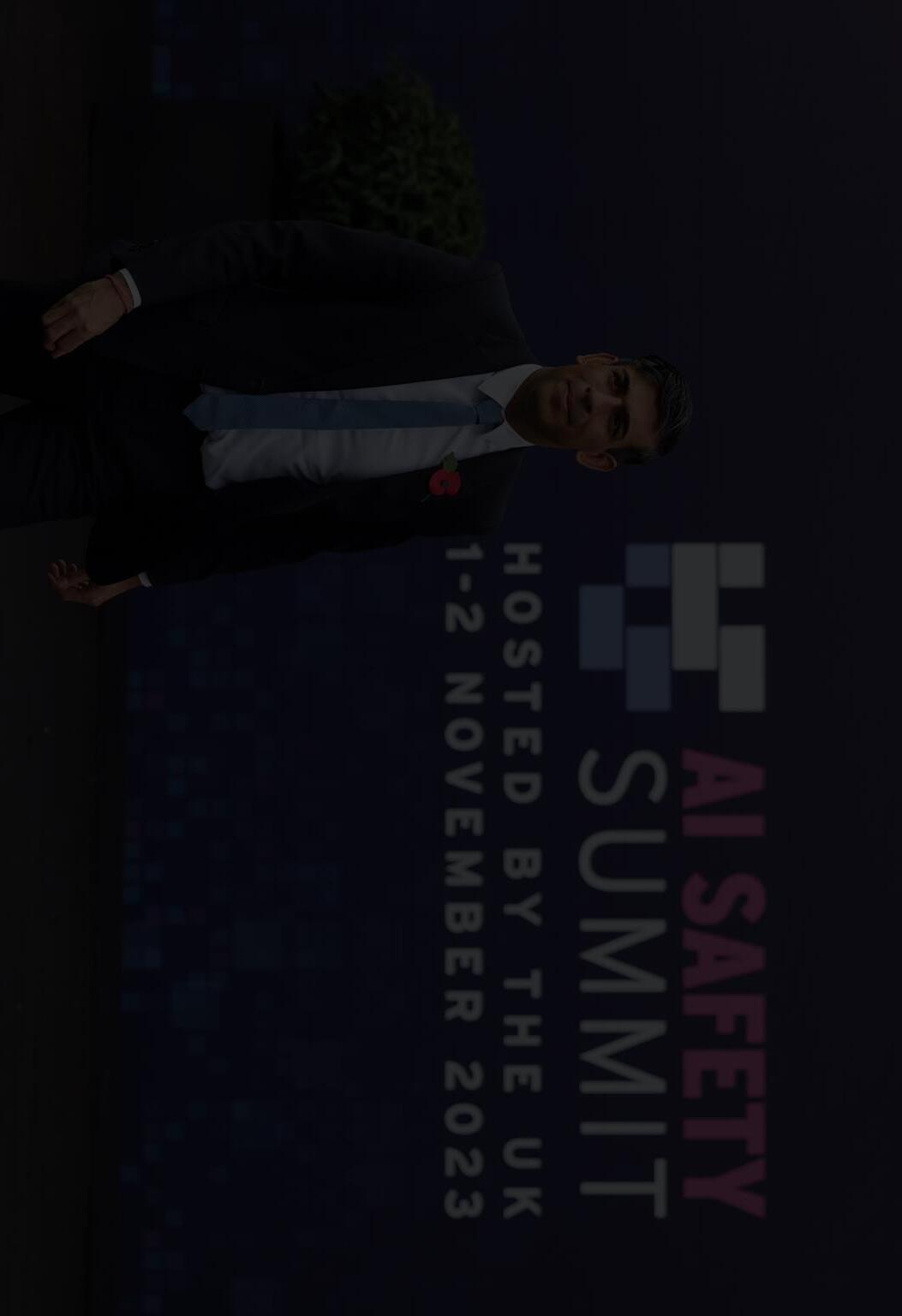
significant roles in pushing the boundaries of AI systems, leading to the creation of one of the best AI of the modern world. An AI that can outperform the best humans in their field. Chat GPT.
However, this advancement in AI has led to ethical considerations and people becoming uncertain about bias, responsible usage, privacy, and job protection. It wasn’t long before AI hit the long and fiery road of politics...
The politics surrounding AI is complex and controversial in today's society. A predominant concern revolves around ethical considerations and the potential misuse of AI technologies. Critics argue that AI, if not properly regulated, may intensify existing societal inequalities, violate privacy rights, and contribute to job displacement through automation. Some argue that leaving certain decisions to machines, particularly in sensitive domains like criminal justice or healthcare, may lead to errors and discrimination. The concentration of AI power in the hands of a few major tech companies is also a source of apprehension, with calls for increased accountability and regulation to ensure that AI benefits society. Currently, delicate balance between the potential benefits and the ethical and social implications of AI continues to shape policy making and is one of the most heated debates taking place.
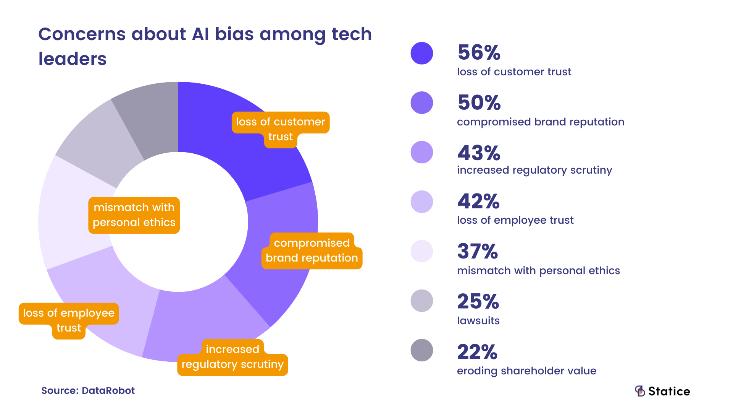
Rishi Sunak believes that AI could simplify the building chemical or biological weapons; to spread fear and destruction; or to facilitate cyber-attack and the spreading of misinformation. While stating that there is not yet cause for alarm, he has also flagged the potential risk of a superintelligence emerging that could cause humanity’s extinction. To address these risks, Sunak announced a UK-based AI Safety Institute to help the world to evaluate new types of AI and understand the risks they may pose. He also proposed – for agreement at the AI safety summit in November 2023 – that the Intergovernmental Panel on Climate Change (IPCC) be used as a model for a global expert panel that could achieve international consensus on the state of AI science.
Has the full potential of AI been explored?
Currently, as shown in the diagram below, AI has not completely taken off because of a couple of reasons.
This can lead to serious concerns. If we are frightened about what AI can currently do, imagine what could be possible if the government gave the green light for full development of AI. We would evolve into a world of AI that we have only imagined after reading science fiction books. The thought is terrifying, right. Now, we have billionaires such as Elon musk and most of the general population are objecting to AI but what is to stop the government censoring these influential people and politicians. Will it be the end of humanity as we know it, or will it be a worry-free life we live with robots and AI assistants doing the work for us? How will it all go down?

Since the start of the UK Parliamentary system, we have seen just two parties dominate the House of Commons. In the past century these have been the Conservative Party and the Labour Party.
The reason for this is our first past the post electoral system. The UK is divided into 650 areas called constituencies, and the representative or Member of Parliament (MP) for each constituency gets one vote in Parliament. So, a party will need 326 seats in parliament to form a government.
When we have a general election, the candidate with the most votes in the constituency becomes the MP and represents that area’s vote in Parliament. Say a constituency has three candidates, A, B and C, and there are 10,000 voters. If A gets 3,334 votes, B 3,333 votes and C 3,333 votes, A will be elected even though 6,666 voters did not vote for them
The result is that the percentage of MP’s does not reflect the percentage of voters who voted for their party. If we look at the last General
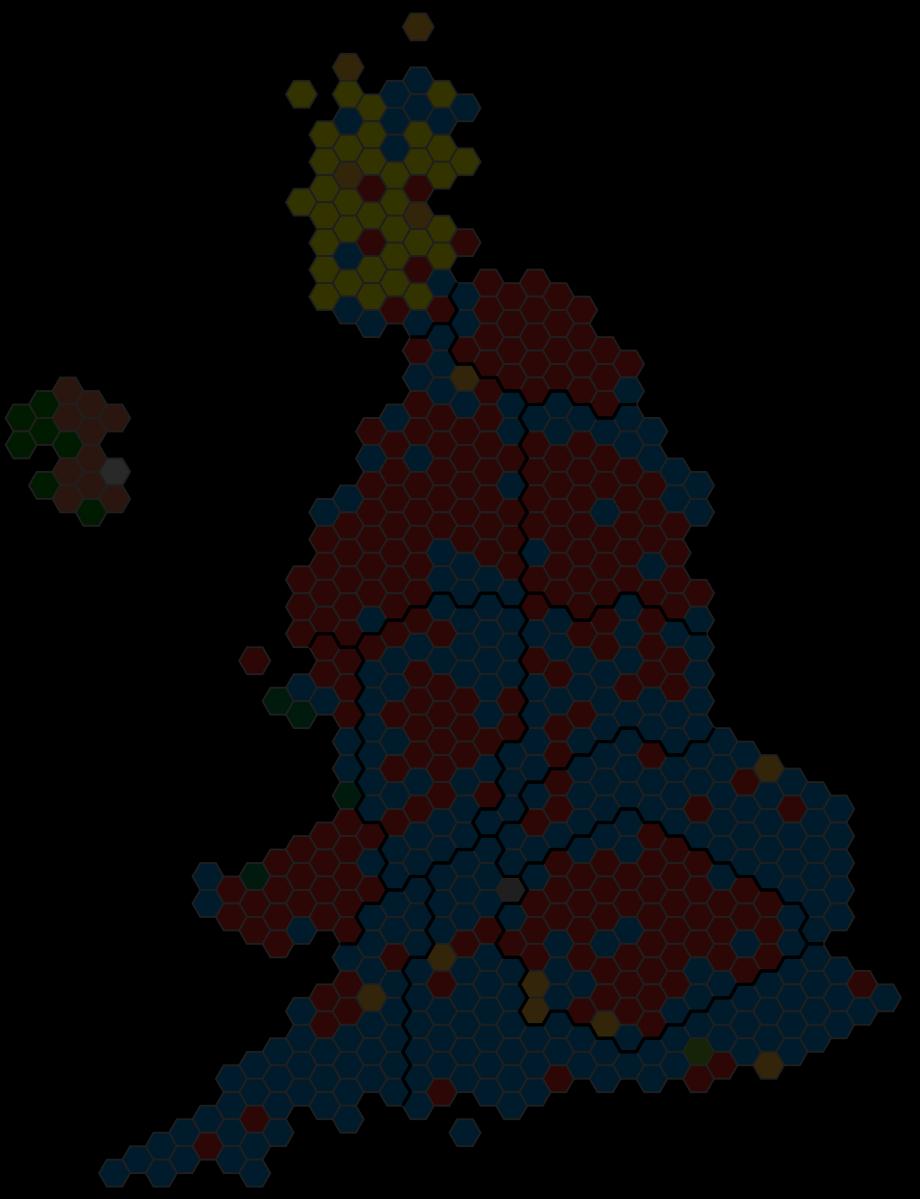
Election in 2019, the Conservates had 43.6% of the votes cast, but won 365 seats (56.2% of the seats).
Whilst the big two parties have benefited from the current system, the other parties feel they are not truly being represented in Parliament and want the election system changed to Proportional Representation (PR). There are number of different systems of PR, which I will not go into here, but basically the number of MP’s reflects a party’s national vote share
Late in 2022 there was a seismic change in the attitude towards PR being introduced in the UK. At the Labour Party conference in September 2022, the majority of the party members supported PR at UK elections. It needs to be noted that the leadership of the Labour Party do not have to follow this vote. So, will we see PR introduced? I think this will depend on what happens at the next election. If the Conservatives win then no; if Labour wins a large majority, I think PR will get pushed down the line, so no. However, if Labour needs the support of smaller parties
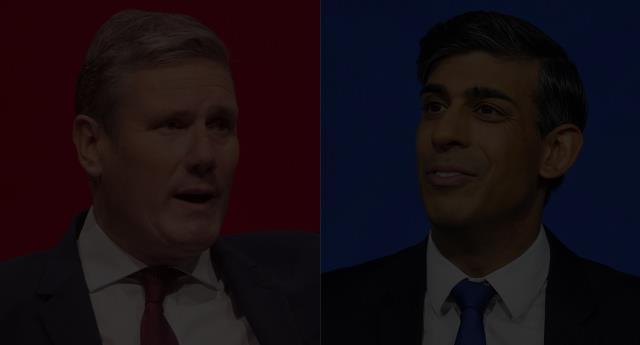
(particularly the Liberals), then yes, it is likely to come into use. If Labour turns to the SNP for support, the answer, I suspect, will be no (SNP got 45% of the Scottish vote but hold 81.4% of the Scottish seats in Parliament), but they would have to allow another independence vote.
If PR does become a reality, is it a perfect system? One advantage of PR is that Parliament will better reflect how the electorate voted –with smaller parties being more involved in Parliament. We will probably see a reduction in the numbers of Conservative, Labour and SNP MP’s and an increase in the number of Liberal Democrats and Greens. We will also see smaller parties represented, including extremist groups.
While most northern European countries who use PR systems have generally seen relatively stable centrist governments, this is not the case in some Mediterranean countries. Here, small extremist groups have held power over weak governments and obtained important positions and policies in return for helping keep a leader in their position.
An argument put forward by those who are against PR is that it breaks the tie between the MP and their constituency. There are a number of different PR systems but generally parties would provide a list of
candidates and, depending on what percentage of the vote they get, they choose the first x number of candidates from their list. Without the direct link to a constituency, that point of contact disappears, and there is no local MP to take issues to. Supporters of PR will counter this using the example at the start of this article, where the MP did not represent two thirds of the local population and for the majority there will be no issue.
So, when I get to vote for the first time after 2028, will I be using the same voting system as the last 250 years? With the next General Election sometime this year, the current government would have been in power, in one form or another, for the previous 14 years. Looking at opinion polls, a change is coming, and the party or parties in coalition, will have a mandate from their members to introduce PR. Therefore, I will say yes, I am unlikely to experience first part the post voting, and with it be unlikely to see two party politics dominating Parliament again.

The dictionary describes the adjective woke as ‘alert and concerned about social injustice and discrimination’. In other words, a woke person is aware of social inequalities like racial injustice, sexism, and the denial of LGBT rights. Over the past few years, society has seen a huge growth in the number of people who we might describe as ‘woke’, about 16% of Britons describe themselves as woke. These are people who encourage critical examination of deep-rooted biases and discriminatory practices. For most of you, this might seem like a good thing, and in theory, I’d have to agree with you. I think it is important that we challenge outdated thinking as we move to a more modern world. However, while maintaining this appreciation of inclusivity and halting discriminatory practice, the escalation of ‘wokeism’ has made it much more problematic than it should theoretically be.
One of the main impacts of a woke society is cancel culture, a phenomenon in which some who are deemed to have acted or spoken in an unacceptable manner are ostracized, boycotted, or even victimized. If someone is cancelled, it could lead to them losing their job and their public image being destroyed. Cancel culture is something that continual worries the young population, because lives are being ruined by it. Adults are getting cancelled for comments they made when they were teenagers-that do not reflect their current positions and come to haunt them due to their previous immature stance. Pope Francis said that cancel culture is ‘a form
of ideological colonization, one that leaves no room for freedom of expression.’ In a society where cancel culture becomes a new norm, people will be too scared to say anything in public, in fear of being cancelled, and freedom of speech will heavily suffer as a result. Can you imagine living in a world where just by making a comment on social media, your whole life would be ruined? Can you imagine years of hard work and experience all going down the drain due to one careless comment? Well, that’s what’s happening now, and I believe it must stop. I think that cancel culture overall is completely immoral and unjust, around 36% of people have said that cancel culture is a big problem. However, this doesn’t go to say that people can say anything that they want without facing any consequences. I believe that people who make racist, sexist, ableist or homophobic comments should have to face the consequences of their actions, but I don’t think that the consequence should be getting cancelled and being denied freedom of speech.
Another result of a woke society is an increase in overly sensitive and easily offended people. If everyone is concerned about social discrimination, then theoretically, everyone can be offended by anything and everything that is said. An `example of this is when Roald Dahl’s books were altered to remove adjectives like ‘fat’ and ‘ugly’ What happened to sticks and stones may break my bones, but words will never hurt? We need to not be so censorious, because otherwise we are

ruining the enjoyment of great works of literature. If we start to censor every single piece of literature because it can offend even a tiny minority, then we’ll be left with little that is worth reading.
In a woke society, so much time would be wasted on minor issues. Society as a whole would be extremely unproductive if we had to cater to each and every single minority on earth. We can’t let ourselves be ‘bullied’ by small minorities who are intolerant of different opinions and want to impose their beliefs on everyone. In a woke society, instead of focusing on poverty, homelessness, or education, we’d be working on removing offensive material and cancelling opposing views, something that reminds me of a dictatorship. Governments are getting distracted from what really matters (serving the country as a whole), already we have seen politicians debating about LGBTQ rights when they should be focusing on the fact that the country is in a cost-of-living crisis. A woke society doesn’t lead to more freedom or a better quality of life. The next generations won’t be taught about the heroics of Winston Churchill or be able to read classic books that we know and love, because someone would have removed them.
I think it is a vital that we challenge our own beliefs by being willing to listen to other people’s opinions- otherwise how would anyone ever change their mind about anything? Ironically, many of the beneficial reductions in prejudices that allowed wokeism may not have occurred if freedom of expression was curtailed in the way it is being today. Scientific (and other) advances all the way from heliocentrism have depended on freedom of expression. And yet, in this modern scientifically developed world, we are now seeing simple biology being disagreed with.
In theory a woke society could have worked, it could have removed all prejudices and racism and sexism and inequality and led to a better quality of life. But in reality, we must admit this just isn’t possible. An extreme woke society will never be as strong or as productive as a traditional society, and if we don’t change our current situation for the better, soon we’ll find ourselves living in a virtual dictatorship whereby disagreeing with the current ideas, you could ruin your life. A society solely run on one belief is something that is very dangerous, and we have seen the consequences of this throughout history. It’s important that there is always a balance between left and right in politics, because without this balance, chaos will entail. I don’t think that there is anything wrong with being woke, in fact I think that the world does need wokism, to tackle problems.
To summarise my article – In life, we have to be exposed to views the disagree with our own, because this brings change and has allowed social evolution, however, if everyone disagrees with everything anyone else says, then this essential progress will be impossible, so while we will always need woke people to remind us that we aren’t perfect, society as a whole shouldn’t be woke, just like how society shouldn’t be solely left or right wing.



What percentage of UK immigrants do you think come to Britain illegally?
a) 4%
b) 10%
c) 20%
d) 40%
e) 5%
This will be revisited, so remember your answer and be completely honest. Migration has long been a defining feature of human history, shaping societies, economies, and cultures across the globe. Nowhere is this more evident than in the rich tapestry of migration woven into the fabric of Britain's history. From ancient invaders to modern-day migrants, the story of migration in and out of Britain is one of resilience, adaptation, and transformation. Let’s start with the historical migration waves that have left the biggest mark on the demographic and cultural landscape in the United Kingdom.
Roman and Anglo-Saxon Periods:
The seeds of migration were sown early in Britain's history, with the Roman Empire's conquest in 43 AD bringing Roman soldiers and settlers to the region. Following the Roman withdrawal, waves of Anglo-Saxons migrated to Britain, heralding a new era of settlement and cultural influence. By the 7th century, it's estimated that the Anglo-Saxons comprised around 1.5 million people, significantly altering the ethnic composition of the region.
Viking Age:
The Viking Age, spanning the 8th to 11th centuries, saw Norse Vikings conducting raids and later settling in parts of Britain, particularly in the North and East. This influx of Norse settlers left a lasting legacy on place
names, language, and cultural practices, enriching the tapestry of British identity. Historians estimate that by the end of the Viking Age, Norse settlers comprised around 5% of the total population of England.
Norman Conquest:
In 1066, the Norman Conquest brought Norman settlers from France to England, marking a pivotal moment in British history. The Norman influx reshaped governance, landownership, and social structures, leaving an enduring imprint on the English landscape. Following the conquest, it's estimated that around 10,000 Normans settled in England, with significant land redistribution occurring in the years that followed.
Medieval Period:
Throughout the medieval period, migration was driven by economic factors, with people moving in search of trade opportunities, work, or refuge from poverty and hardship. These movements contributed to the dynamic exchange of ideas, goods, and peoples across Britain and beyond. By the late Middle Ages, urbanisation and trade networks had facilitated the movement of people within Britain, with cities such as London experiencing significant population growth.
Huguenot Immigration:
The 17th century witnessed the arrival of Huguenot refugees, French Protestants fleeing religious persecution. Seeking sanctuary in Britain, the Huguenots brought with them skills in silk weaving and other trades, enriching the country's industrial landscape. Between 1670 and 1710, it's estimated that around 50,000 Huguenots settled in England, establishing communities in cities such as London, Canterbury, and Norwich.
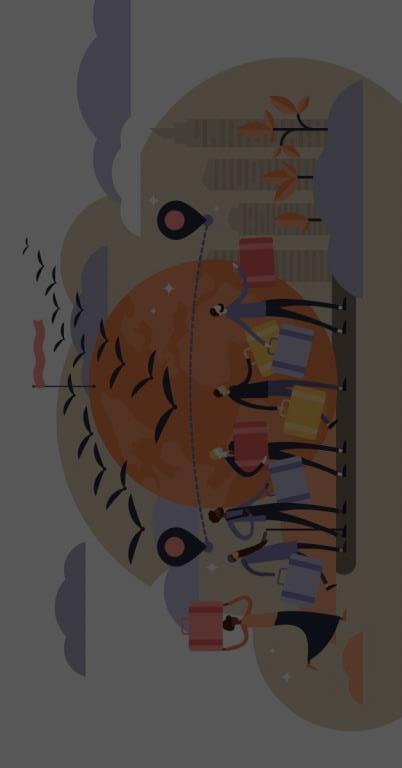
In the 19th and early 20th centuries, Ireland's devastating Potato Famine prompted mass migration primarily to North America, particularly the United States and Canada, as millions sought relief from famine and poverty. The Irish diaspora became an integral part of North American society, leaving an indelible mark on culture, politics, and economics. However, there were also significant flows of Irish migrants to Britain during this period, albeit not as substantial as those to North America. Waves of Irish immigrants arrived in British cities such as Liverpool, Manchester, and Glasgow, seeking employment opportunities in industries such as mining, construction, and domestic service. By the early 20th century, Irish immigrants and their descendants constituted a significant proportion of the population in cities like Liverpool and Glasgow, contributing to the cultural and social fabric of urban life in Britain.
Similarly, Jewish communities sought refuge in Britain from persecution in Eastern Europe during the late 19th and early 20th centuries. Their contributions to British society spanned fields such as finance, literature, and the arts, shaping the cultural mosaic of the nation. By the early 20th century, it's estimated that there were around 300,000 Jews living in Britain, with significant communities in London, Manchester, and Leeds. Stamford Hill and Golders Green in London also compromise of significant Jewish communities.
The aftermath of World War II brought about significant migration from Commonwealth countries, as Britain sought to rebuild its economy and address labour shortages. The arrival of the Windrush Generation from the Caribbean marked a turning point in Britain's demographic makeup, heralding an era of multiculturalism and diversity. Between 1948 and 1970, around 500,000 people from the Caribbean migrated to Britain, with many settling in cities such as London, Birmingham,
and Nottingham. Did you know that more than 3 million South Asians now live in the UK?
In more recent times, the expansion of the European Union in 2004 and 2007 led to increased migration from Eastern European countries, particularly Poland and the Baltic states. This influx of EU migrants contributed to debates over immigration policy and Britain's relationship with the European Union. Between 2004 and 2019, it's estimated that around 1.3 million EU nationals migrated to the UK, with the majority coming from Poland, Romania and Bulgaria.
From June 2022 to June 2023, the United Kingdom experienced a notable influx of immigrants, with an estimated 1,180,000 individuals making their way to its shores. This surge in immigration reflects the ongoing global trends of mobility and migration, as people seek opportunities, refuge, or reunification with family members in new lands.
However, amidst this significant flow of migrants, there were instances of unauthorized entry, with 52,530 individuals detected as arriving illegally. This figure represents approximately 4% of the total immigration during the specified period. While the vast majority of immigrants enter the UK through legal channels, the detection of individuals arriving unlawfully underscores the challenges faced by authorities in managing border security and enforcing immigration laws.
Now, to be fair, if you incorrectly answered the question at the start, you are not at all alone. According to a YouGov poll done on 18/1/24, a significant majority of the population was also mistaken, 64% in fact. Think of the impact this misunderstanding has on politics, where many mat trying to solve a non-existent problem.

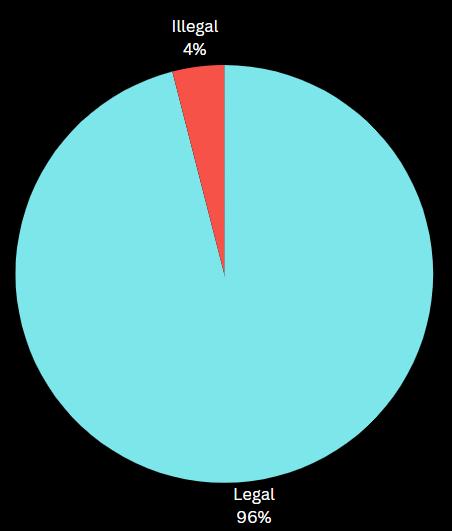
Another question: Do you think that migrants arriving by the Channel crossing on small boats be stopped?
a) Completely
b) Agreat deal
c) Partially
d) Not by much
e) Not at all
According to a YouGov poll done on 12.12.23, which can be seen below, a significant majority, 68%, think migrants entering by the
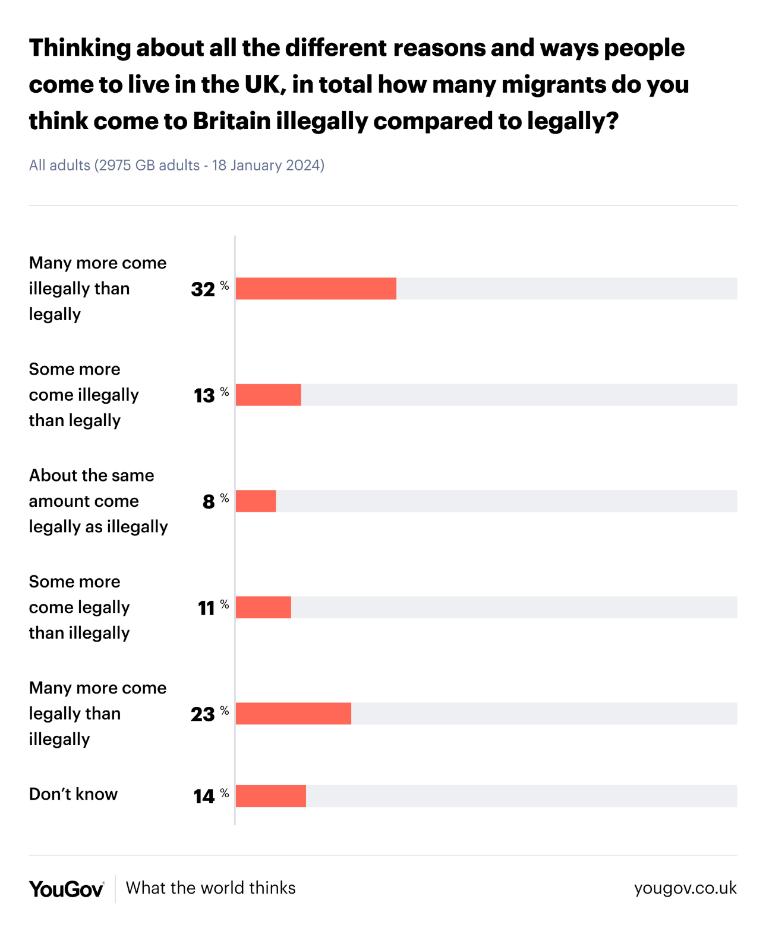
channel on small boats can least be reduced. 22% think it cannot be reduced much.
But have crossings gone down? No, they have consistently gone up since 2018. However, the data in 2023 seems to suggest 2023 was roughly the same as 2022. This means that the upwards trend seems to have slowed. However, it should be noted that data from July onwards (which is when most crossings are detected) is not present for 2023.
Small boats migrants: instant removal, or process the claims?
According to a YouGov poll done on 1415/9/23, which can be seen on the next page, there is a clear divide between views people hold on the Conservative and Labour small boats policy. Britons gave Labour’s view 5 more percentage points, although this may be a reflection of general dissatisfaction among the populace with the Conservative Party, and neither view has the majority.
In conclusion, I believe that people should check the facts before hopping onto political bandwagons, in order to nurture and safeguard democracy, freedom and human rights.
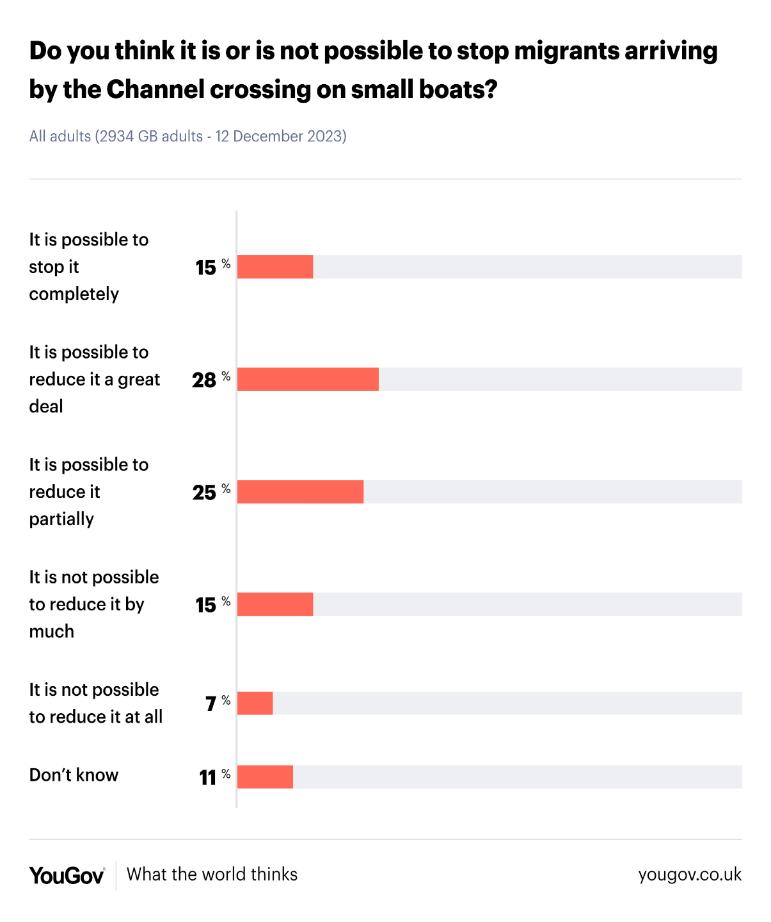
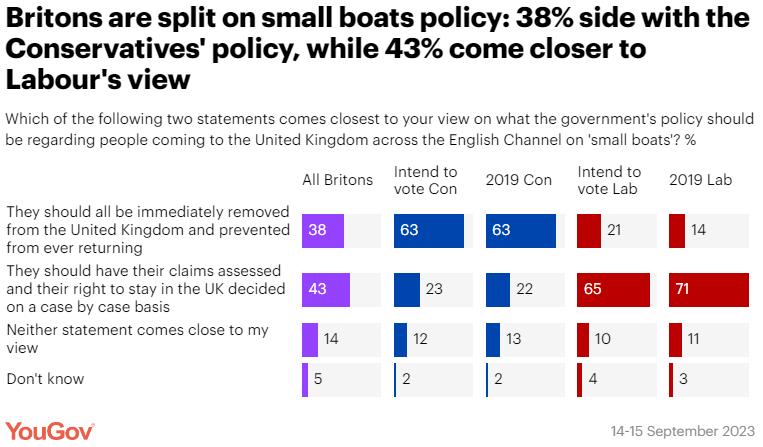
Here is the Amazon description; “Are our brains wired to hate? Is social media to blame for an increase in hateful abuse? With hate on the rise, what can we do to turn the tide? Drawing on twenty years of pioneering research - as well as his own experience as a hate-crime victimworld-renowned criminologist Matthew Williams explores one of the pressing issues of our age.
Surveying human behaviour across the globe and reaching back through time, from our tribal ancestors in prehistory to artificial intelligence in the twenty-first century, The Science of Hate is a groundbreaking and surprising examination of the elusive 'tipping point' between prejudice and hate.”
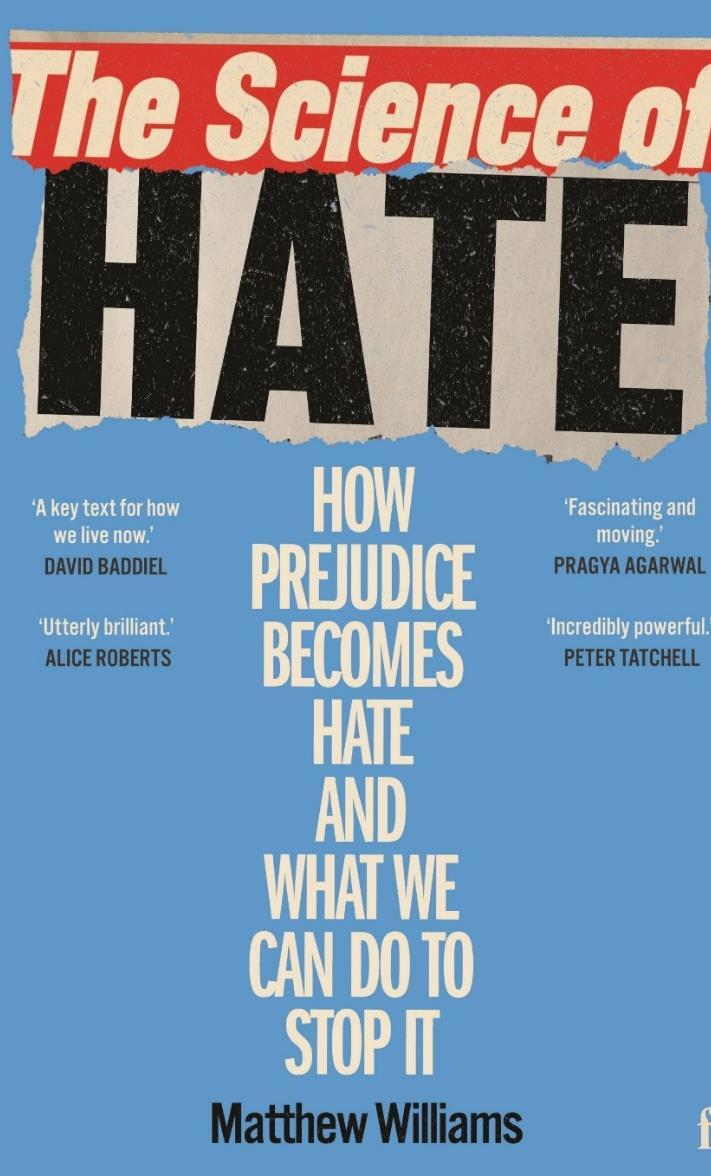


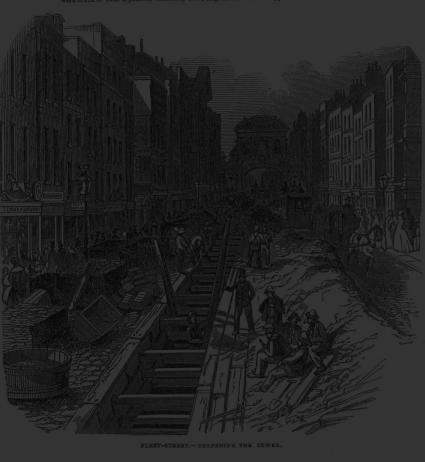
In 2019, a sewage plant, run by our local water company Thames Water, illegally discharged sewage for 21 hours with no notification to staff or the Environment Agency and no mitigation measures implemented.
Clearly, the water industry has issues, but what are their causes and, ultimately, does nationalisation give the industry the best chance of solving these problems?
The water industry in England provides water and sewerage services to 29 million households, as well as offices, hospitals and schools. It also performs the vital role of cleaning water via 7,000 treatment sites, dotted across the country.
Since privatisation in 1989 under Margaret Thatcher, the water industry has been run by nine major water companies, with the largest of those being Thames Water, who supply water to around 20 million people. These companies inhabit a natural monopoly, which means that customers don’t have a choice as to which water company provides their water and sewerage services Therefore, strict regulation of the industry is vital.
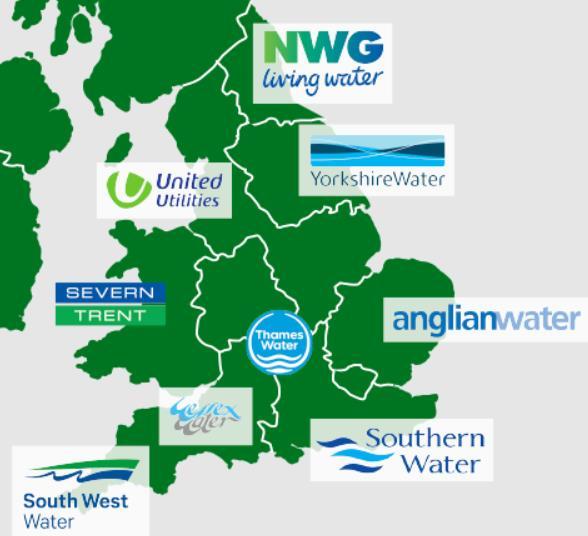
This regulation entails two bodies: Ofwat, the economic regulator of the industry, and the
Environment Agency (EA), which monitors the companies’ environmental performances.
The current issues facing the industry can largely be split into three main fields:
Last year, raw sewage was dumped into English rivers 824 times a day on average, and just one of the nine companies received a full four-star rating for environmental performance in the EA’s 2022 report. In addition, these sewage spills are now causing a public health issue, with E. coli recently found on Blackpool Beach following an illegal discharge of wastewater.
Just £4.3bn worth has been invested annually between the companies on average since 1989, leaving us with Victorian infrastructure that isn’t fit for purpose. Storm overflows are mixed with wastewater, and then this combination is legally discharged, causing mass environmental damage, whilst companies such as Thames Water leak around 25% of water.
Extraction of over £72bn from the water companies through dividends since 1989 has left Ofwat worried about the financial stability of at least four companies, including Thames Water, whose CEO quit in June 2022 because of concerns about the financial stability of the which has accrued over £10bn worth of debt.
Poor regulation has largely allowed companies to operate as they please, with the EA fining Thames Water just £3m for the aforementioned sewage discharge in 2022. The owners seem to believe that they can get away with poor investment because of the inaction
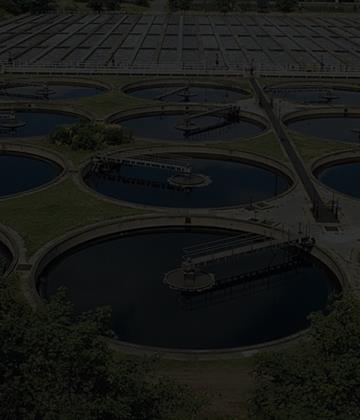
of Ofwat. In addition, Ofwat sets price caps every five years, and these have effectively blocked investment from companies.
Secondly, poor company accountability is evident in many of the environmental and financial failures of the industry, from the 52% of serious incidents that weren’t reported to the EA in 2022 to the fact that the interests of the owners (6 out of 9 who are pension and investment funds) don’t seem to line up with those of the customers.
But it is also imperative to recognise that growing demands are also putting increased strain on the industry. The population has been steadily increasing, and this, combined with the increasing prevalence of water-intensive industrial processes and tougher environmental restrictions, has created the perfect storm for issues within the industry.
Would Nationalisation solve these issues?
To understand whether nationalisation would solve present problems, it is important to understand the situations in other countries, as well as to take into account the history of England’s water industry pre-1989.
Scottish Water was never privatised, and this has allowed bills to fall by 20% in real terms in the last 10 years (in comparison to 9% for England), but sewage discharges are a growing problem, with an increase of 40% in the last 5 years, as illustrated in the below graph, demonstrating that nationalisation would not intrinsically solve current issues in England. Welsh water was privatised in 1989, but collapsed in 2000 due to financial issues, and
now is a not-for-profit organisation, allowing more than £450m to be reinvested into the company for consumers benefits, but there are questions over whether this system would work on a larger scale. In contrast, the French water system is private, but uses a franchise model which removes the natural monopoly, allowing companies to bid for the right to serve a particular area for a certain period of time.
But what about England pre-1989? The industry was simplified into the 9 regional bodies we know today following WW2, but these publicly run bodies ran into financial and environmental issues (akin to those we are seeing today) in the ‘70s and ‘80s. The 1983 Water Act aimed at increasing investment by letting the water industry access private lending markets. However, the government was unwilling to provide more public funding, leading to nationalisation in 1989.
Nationalisation would benefit financial stability, but many feel that there is little guarantee or even hope of increasing investment under a publicly run system, and that a change would cost taxpayer money, and delay investment that is needed now.
Success is difficult in the industry, and nationalisation wouldn’t intrinsically solve current issues – but neither will a continuation of the current system. It is up to the government, and, ultimately, you, to decide whether the advantages of nationalisation outweigh the disadvantages, but a potential incoming Labour government will have to grapple with the idea that success is more about implementation of a system than the actual system itself if they are to improve an industry that is in a crisis.
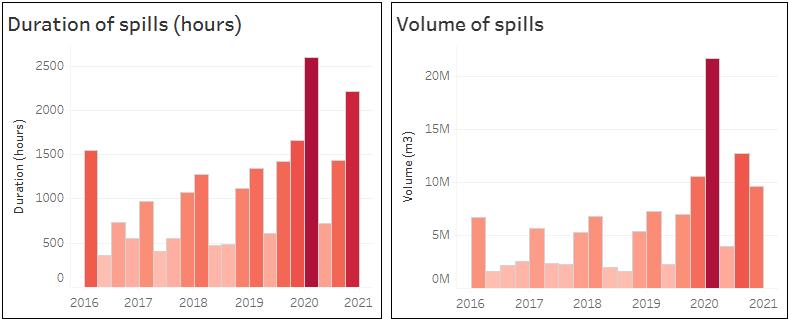

British democracy has been changing for a very long time. Ever since 1215, when the Magna Carta was signed, the monarch has been consistently losing power, and more and more people have had a little bit more power too, until we reach today’s democracy. And, without there ever being a revolution, ancient customs, traditions –relics of a lost age, you might say – live on. There are still hereditary peers in the House of Lords. It is customary for one individual to slam a door in another’s face. But perhaps the one that impacts today’s democracy most is our voting system of First Past the Post, or FPTP. It could be argued that it is not an old relic – that it still has value today. But it has been left behind, as it has been abandoned or ignored by myriads of democracies. Some say it should be changed, that it is a thing of the past. They say we should have Proportional Representation, or PR, instead. But such a vague term. What is it really? Very few understand the many variations of it, or even what it truly means.
What is FPTP, and why is it successful?
Before we understand what PR is, we must first understand what we have already. FPTP, used in Britain and many of its colonies, but not typically beyond, has been used here for centuries. It is exceedingly simple compared to the peculiar varieties of other systems. It is in essence a simple who-gets-the-most-voteswins. A country is divided into approximately equally sized districts, or
constituencies, and whosoever gets most votes becomes an MP. And, for years, it has served Britain. A strong constituency link is formed. Everyone has one representative, who represents you and your interests. In some cases, you can send a letter to your MP voicing your interests. They are your representative, and, supposedly, they will listen. This can help people feel represented and heard. For centuries, it has yielded stable secure governing. In very few elections is there not one winning party with a majority. No talking, just an instant forming of a government. After an election, the winner simply drives to Buckingham Palace and becomes PM. It allows decisions to be made quickly and efficiently without any agreement. The PM and their Cabinet have almost ultimate control over a country. Things get done. And it prevents any party without heavily concentrated support or a vote share large enough to compete with large parties to have any say in governing, or even a vote in parliament. Extremists cannot become seen as plausible to vote for and have almost never got a seat in the House of Commons. But there are faults, and people who want change. In the end, people vote for policies and leaders, not a simple person to represent them at an individual level. People vote for the party they think will help the country, and themselves most. And, because of FPTP, some parties are not heard, and others get huge majorities in government when more voted for others.
Demands to end FPTP are based on certain arguments. The one least known is specificity. Some say that voters cannot specifically choose who they are voting for. In Britain, party members choose that party’s candidate for a constituency in the UK. That party member is chosen for a party, but their political parties in Britain encompass many different factions and variations. Therefore, voters cannot choose which specific ideology or faction they like most. It means a voter cannot choose a specific individual that they feel closest to because FPTP does not accommodate that. Instead, party voters have more power in this aspect on who actually gets into parliament. More extreme MPs can be elected that the public never actually wanted in the House of Commons. In this way, PR are handed more power than the average voter in an undemocratic way. Another key argument is wasted votes. Every vote that does not help contribute to a party’s winning of a seat is considered wasted. It does not change the election’s outcome. It is so high in FPTP because every vote in a constituency except the number of votes for the second placed party plus 1. Once one party gets more than all the others, every other vote that does not contribute to beating the other candidates is obsolete. It becomes useless. In FPTP, wasted votes make up over half of votes cast. This decreases electoral participation, because people feel as if their vote doesn’t matter. Because of this, power becomes more reserved for the elite. Poorer people are first to stop voting, with consistently lower turnout in more deprived areas. In Kingston-Upon-Hull East constituency, the percentage of voters who actually voted, or turnout, was only 49.3%. In comparison, Richmond Park (an affluent suburb of London) had a turnout of 78.7%. It can become undemocratic and ignorant, often, of everyone’s wishes. Elections can become more and more reserved from real life played by the rich,
meaning that people become less interested in politics. In this way, politics can become elitist, and the poor can be voiced less than what might otherwise be the case.
But the most problematic is not the above points. It is proportionality. Proportionality is how well proportions between parties’ votes equate to those between parties’ parliamentary seats. In FPTP, it is awful. In Canada, the Liberal party has been in power without more votes in the last election than the second party. Not only did more people vote against the Liberal party in the last election, but more voted for another. In the last election in Britain, more voted for a Remain party wishing for another referendum, yet a Leave party was delivered a huge majority, and gave a hard Brexit most did not vote for in that election. Parties almost always get a majority of parliamentary seats without the majority of votes in a FPTP system. This leads to what is often called an “elected dictator”. Once a party gets a majority, it has almost complete power over policy. In Britain, the Prime Minister appoints “Whips”. In essence, they force members to vote the way of the government. Because of that, the cabinet can create and then enforce policy like a dictator. And they were not voted by a majority. Parties work against each other to get into parliament and then enforce their own policies. A middle way in which parties work together is not found, and it is often that politics can become highly polarised, often not pleasing a majority without any consensus or agreement. Some see it as undemocratic. Parties almost never have majority support, yet they still get into power.
The solution, many believe, is another political system. One that has its roots in the Netherlands. It is a collective term for systems that endeavour to have proportional representation – and the term is just that: Proportional representation, or P.R.

What are the major types of P.R, and why is it successful?
Proportional representation is used across the world. It is used from Poland to New Zealand and Spain to Honduras. It is far more common than FPTP, only used in Britain and its colonies. But there are countless themes and variations of the collective term “P.R”.
By far the most common is the party list multi-member constituency system.
Similarly to FPTP, the country is divided into constituencies – but, instead of one MP per constituency, multiple are assigned to each. The constituencies can vary in size, as different numbers of MPs can be assigned to each constituency. This ensures that each person’s vote has roughly the same importance, as when they are in a larger constituency, the importance of their vote is diminished if voting for one candidate, but with more MPs elected by that constituency than a smaller one, the above is countered as a vote contributes to the election of more MPs. It works by each voter voting for one political party. When it is counted, different numbers of votes are given to each party. This is then interpreted by an algorithm (which can vary greatly) to give each party a number of seats. MPs are taken from a list decided by either the party or the voters, depending on whether it is open (decided by voters) or closed (decided by the party) list. MPs are chosen from the top of the list and MPs are chosen downwards from there. It is widely considered to be the most proportionate system, and it is the best with deciding specific members that the community want with the open-list system – people, not party members choose the faction they want in parliament. Furthermore, wasted votes are reduced drastically, as every vote can help to get another seat in a constituency.
The most popular in Britain is known as AMS. It stands for additional member system, and that is what it is. FPTP is
used, but then a number of seats are then added to make the result proportional based on another set of votes (you typically vote twice in AMS) selected from a list. It maintains the FPTP constituency link, but becomes far more proportional with “overhang” seats.
The final type is STV. It is barely used in the world, but is one of the most common systems proposed in the British Isles. It is undoubtedly the most complicated, and has many complex and fiddly rules. Instead of electing parties, it bases itself on electing candidates. Parties have no effect on the system, contrasted to multi-member party list-using countries. The country is divided into multi-member constituencies. Each voter ranks as many candidates as they like on their ballot, before they are used to select the multiple representatives for that area. A quota is calculated by divided the votes cast by the number of seats plus 1 in that constituency added to 1. The purpose of this is to only elect candidates with enough support to garner a seat if that seat were isolated. Only candidates that surpass the quota elected. First, first preferences are counted. If a candidate gets or gets more first preferences than the quota, that candidate is immediately elected. Their excess votes (how many more votes they have compared to the quota) are counted, and the proportion of excess first preferences to total first preferences is calculated. Then, this proportion is assigned to each of the voter’s next preference as a proportion of a whole vote. If no candidate reaches the quota, the lowest placed candidate is eliminated and the voters who voted for that party are transferred to their next preference. However, it is common, as most voters do not include every candidate in their ranking, for votes to not be transferred. If there are x candidates left with x seats and none have reached the quota, the remaining parties automatically are elected. It has been called a compromising system which gives everyone a vote and effective at creating a

constituency link with a lower number of representatives per constituency than party-list multi-member constituency systems. It has also been said that it creates very few wasted votes with the abovequota transfers.
Why should we not choose P.R?
Despite its often appealing nature, it must, as all new things, be treated with caution. There are many reasons, in fact, why FPTP is better. Firstly, it can lead to highly factionalised politics. The Netherlands has a plethora of marginally different political parties in parliament. Seventeen parties currently exist in parliament, and it is common for coalitions (agreements between parties to work together in government) to fall apart. Stable governance can become rare, while it takes far longer to form a government when compared to FPTP. It can take a long time for the choice of the people to get into parliament, and the potentially rejected government can stay in power for months after an election. This is most evident in the more proportionate system of party-list multi-member constituencies. However, electoral thresholds and algorithmic modifications can be made. An electoral party can need to have a certain number of votes to be able to get into a parliament, and the algorithm can be adapted to prevent smaller parties from getting as many seats while still retaining proportionality between parliamentary parties. The same can be done with overhangs in AMS.
The constituency link is one of the most controversial in Britain. FPTP yields an excellent relationship between representative and people. However, all three major P.R systems have sizeable issues in this regard. Party-list multimember constituencies can lead to extremely large districts of tens of seats, heavily weakening the constituency link. It would be far harder to remember who all your MPs were, let alone contacting them.
It could make people feel reserved from politics without someone you could know was representing you. In AMS, being represented by two different groups can feel overwhelming and confuse constituents about who is the real representative. STV is the least affected but is similar to party-list multi-member constituency systems on a smaller scale. Finally, it allows radical, extremist parties to gain a foothold in parliament. It can mean there is more of an antiestablishment and non-constitutional movement in legislatures, such as fascist or communist parties. Like the Nazis in Germany, another extremist group could begin to uproot democracy from within, bringing even more unfair restrictions on people. It is a fear that must be recognised and considered before any action is made. The more proportionate the system, the more vulnerable it is to this, putting the party-list multi-member constituency most at risk. Despite this, it can have modifications and electoral thresholds to combat this (see above) for both this and AMS.
In conclusion, the argument for FPTP to end is enormous, but so is the argument against P.R. There will be arguments for it and against it for a long time. Which is better is highly debatable – some will argue that it provides a more democratic system that encourages the majority and consensus between parties. Others say we need a strong, stable government. But in Britain, the voice for change is growing stronger – and the debate will continue. So research P.R, and decide on your own view. Which way should Britain go: P.R, or what has been for centuries.

As technology has evolved, the media has become more prevalent in our day-to-day life, whether it be in the form of social media or reading the Guardian on our phones. It is not just our interaction with the media that has drastically increased, but now, the media’s growing link to politics has become inextricable, propelling politics to the front light. While strengthening the democratic power of citizens with their access to information, its interference in politics has also undermined democracies in ways which will only get worse.
Social media allows politicians to engage with us so that they can establish our trust, communicate with us, and provide reliable information to people. It is also crucial for campaigning, allowing the data available on them to be used by politicians to gauge how people respond to an issue, and then act accordingly to not only gain popularity but also ensure they get fundraising donations. President Obama is a good example of the ways in which social media can be used by politicians. In his campaign for American presidency, he used data to develop market campaigns and identify and target new voters through social media, allowing the audience to capture his key messages through resources on his website. He was also able to raise $690million for his campaign. His expertise in social media changed the entire political landscape of campaigning as he outcompeted influential political rivals and now, he has made social media a powerful tool to directly appeal to the public and allow politicians to express their credibility.
However, the interaction of politics with the mainstream media, and social media,

brings about huge challenges. One problem lies with the issue of microtargeting, whereby companies use and collect your data to understand your demographic and political affiliation. This means social media can target specific messages and campaigns to you based on what you personally believe. Although this may be good for getting supporters from a political perspective, it has a twofold effect. Firstly, it means that politicians and parties target specific categories of people which they can easily appeal to on social media and send tailored campaigns to them. For example, doctors and nurses may receive campaigns different from businesspeople. This gains traction for a political party, as campaigns are designed with multiple different messages to lure a larger set of people into voting for them. What does this mean though? Well, politicians and campaigns have a much less consistent message which can lead to confused manifestos. diminishing the core values of a party and perhaps leading to weaker governance.
In addition, social media has become vulnerable to the growth of fake and misleading news. It is thought that on Twitter, home to many politicians and how they communicate, false news spreads six times faster than real news, making misjudgement more likely, thus undermining democracy. Let’s go back to 2016. The US was having a presidential election to elect either Donald Trump or Hilary Clinton. Russia was thought to have interfered, during this election, to make sure that Donald Trump came in power. This was done through the creation of Russian linked bots on Twitter that consistently advocated for Trump as leader. This allowed Russia to potentially
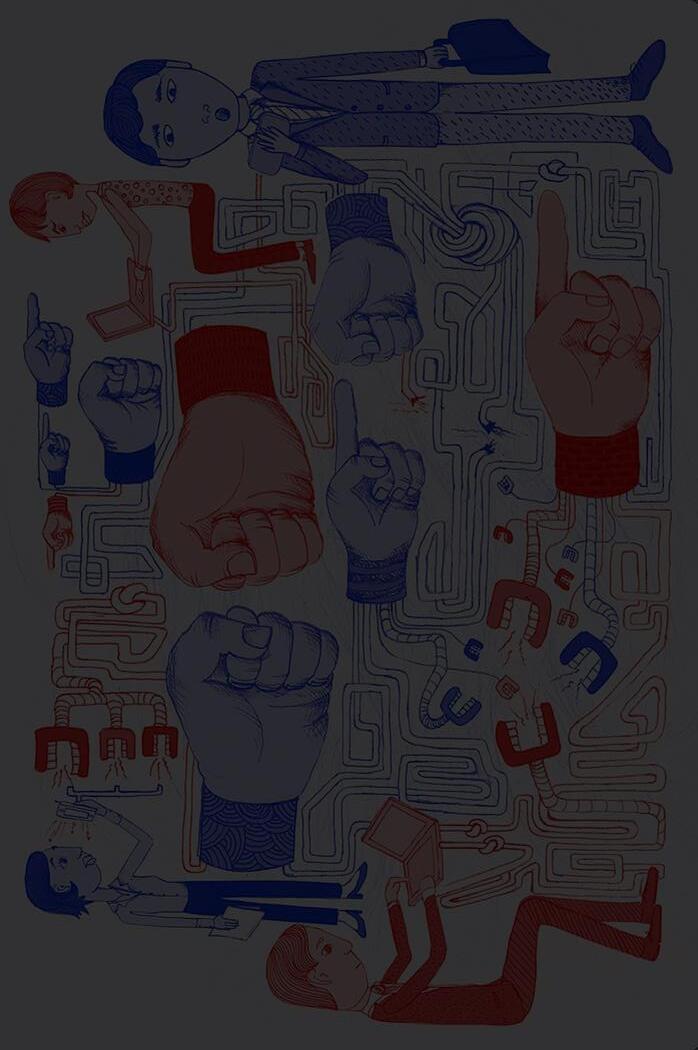
boost Donald Tumps votes by 2.3%. This created a divide between people and not only reinforced people’s prior opinion, but also spread rapidly through social media microtargeting. This had a great influence on who people voted for and caused tension on an international scale as Russia tried to gain control.
Similarly, mainstream media can interfere with politics and can escalate political tensions to a whole new level. One example is the Iraq war, which started on the 20th of March 2003 with the aim of US forces invading Iraq to oust its dictator, Saddam Hussein. The US accused Iraq of not only having a mass destruction weapon program but also misled the public about the fact the Iraq was involved terrorist organisation that were supposedly involved in the 9/11 attack Newspapers such as the New York times admitted to the fact they misinformed the public, spreading erroneous and misinterpreted evidence of Irani defectors. This evidence was used by the Bush administration to try and highlight Iraq’s supposed holding of Weapons of Mass Destruction. The media cannot be blamed entirely, of it was the ultimately the responsibility for Bush and his administration, but it is a good example of how the media can bring about change in political direction due to factual incorrectness
The second problem is that, as social media tries to keep the attention span of a person, it constantly allows people to be fed with information that reinforce their biases and views, so they don’t stop using that media. However, this results in the formation of an echo chamber, which aggravates political tension as it means political parties and supporters do not share a basis from which they can compromise and instead become firmer in their own belief. This consequential shift to more extreme beliefs and divergence of
political attitudes is known as political polarization. Remember the US Capitol Riot on the 6th of January 2021? Large crowds converged near the Capitol building and used weapons and metal poles to break into it and more than 2,000 people entered the building. A key contributing factor to this event was the use of social media. The event started with far-right militia accumulating and growing on mainstream and lightly controlled social medias. The large amounts of misinformation created allowed them to achieve traction growth across further social medias. For example, Parler, a lightly moderated site was used by Trump supporters to plan the event. This was exacerbated by social media algorithms, that spread to those who had similar beliefs, and resulted in huge numbers of people being involved
In conclusion, the evolution of the media has had a huge impact on politics, both positive and negative. However, without intervention and monitoring, social media can spiral out of control and detrimentally interfere with politics. At times, it is perhaps in need of tighter and stricter intervention to monitor extremism and prevent the formation of echo chambers. Whatever happens, the media, and specifically social media, has a huge influence on politics

Why are you interested in politics?
A major focus of my history degree was political history, and particularly the development of party politics and suffrage in the UK. I specialised in Anglo-Irish relations.
I also like the unpredictability. Everyone approaches politics with different views; everyone has a different opinion.
How did Margaret Thatcher impact politics?
She was very divisive. Her policies and opinions divided Britain completely. Margaret Thatcher’s Government destroyed any British post-WWII consensus. Thatcher survived long enough to divide her own party; she was brought down from within.
If you could meet any former UK Prime Minister, who would you meet?
I would choose to meet William Gladstone, who interestingly served as Prime Minister four times. He was active in parliament from the 1830s to the 1890s, serving for both the Tory and Liberal parties. My historical studies were focused on him, so there is a great deal that I could ask him about.
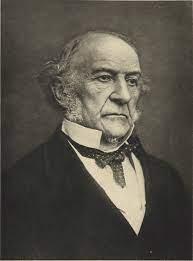
Stanley Baldwin would also be interesting. He served during the interwar years and is largely forgotten, overshadowed by Lloyd George, Churchill, and others. His premiership oversaw some of the UK's most tumultuous periods, including the 1926 General Strike.
Why might a career in international politics be useful?
International relations is a vast topic. The UN and the EU General Assemblies need skilled, educated people who understand the bigger picture. At the same time, some civil servants advise the Foreign Office, and some diplomats represent the monarchy.
What is the best route into politics today?
The people want the best representatives for themselves. For some, prior experience in business is important. There are also some merits to career politicians. Politicians can be susceptible to outside influence. MPs who used to earn £20,000 per year begin to earn £80,000, and don't want to lose their whip. It's also important that politicians are not idealistic, but instead lead with common sense.
Should ministers be specialists on departments they lead?
It is not always necessary. In an ideal world, there would no limitations in the amount of expert advice that they could consult. It is equally, if not more, important to have experience in politics
because they can fight the corner. It is difficult to be both an effective politician and a subject specialist. That said, if you can find an expert then they can use that to inform their decisions and policies.
If you could reverse one British political decision, what would it be?
The British knew about the Holocaust from 1942 onwards. However, the British did nothing to stop it because they didn't want to show the enigma code was cracked. I understand the thinking behind it, but it isn’t something that feels entirely comfortable.
Why should young people be involved in politics?
Many decisions made in politics affect the whole nation, but young people don't have a say until their eighteenth birthday. In schools, teachers prepare young people for the future and equip them with the necessary tools to make rational decisions that benefit them. In many ways, young people are one of the most vocal groups at the moment. We see passionate campaigning on social issues and many young MPs in the Opposition. Young people can be very polarised and will protest a decision they don't like. However, 18–24-year-olds have the lowest electoral turnout. On the other hand, especially in America, politicians continue working after 60, not having a grasp of issues affecting 18-year-olds. Each vote makes a big difference in the bigger picture.
What is the biggest challenge facing education?
I have spent 12 years in teaching. There has been a big increase in the amount of
mental health problems seen within schools. Perhaps post-pandemic anxiety? Screens are increasingly being used for everything, and children and parents are growing further apart. Growing anxiety leads to persistent absences of students. Ultimately, we should adopt a proactive approach and seek to improve access to mental health support charities, the NHS and Bromley Y - in general more needs to be done to address the mental health crisis. Teachers are amazing but they are not mental health professionals.
If you were Prime Minister, what would you do?
At the moment, the biggest issue is the economy. All other issues cannot be solved without addressing these underlying issues. We can't solve education or healthcare unless the economy is under control. We need an excellent chancellor who is appointed for merit rather than loyalty, regardless of party allegiance.
What makes identity politics relevant in the modern world?
Prof. Pippa Catterall gave a talk on diversity and inclusivity on the Thursday of Political Awareness Week 2023. She distinguished the difference between marginalised and minority groups. For example, the Prime Minister, Rishi Sunak is Hindu. This makes him a minority but not marginalised. She also spoke about how some majority groups who achieve success think that lower groups will dilute the power at the top. Everyone must be treated equally but the system hasn't necessarily grown like that and identity politics can sometimes help to address this.


1) What colour are the seats of the House of Lords and House of Commons respectively?
A) Both are green
B) Green and red respectively
C) Red and green respectively
D) Both are red
2) Who is the President of Germany?
A) Angela Merkle
B) Franz-Walter Steinmeier
C) Olaf Scholz
D) Robert Habeck
3) Who were PMs of UK between 1970-1980 (in chronological order)?
A) SirAlec Douglas-Home, James Callaghan, Harold Wilson, Baroness Margaret Thatcher
B) Harold Wilson, James Callaghan, Harold Wilson, Baroness Margaret Thatcher
C) Sir Edward Heath, Harold Wilson, James Callaghan, Baroness Margaret Thatcher
D) Baroness Margaret Thatcher, Harold Wilson, Harold Macmillan, James Callaghan
4) Which country had the highest GDP per capita in 2022?
A) Luxembourg
B) Qatar
C) USA
D) Monaco
5) By whom was the Magna Carta stamped? When?
A) Richard I,April 15th 1215
B) Henry III, June 15th 1220
C) King John,April 15th 1215
D) King John, June 15th 1215
6) When did China regain control over Hong Kong from British rule?
A) 1st June 1996
B) 1st July 1997
C) 1st June 1997
D) 1stApril 1996
7) Which currency has the most buying power in the world?
A) Swiss France
B) Kuwaiti Dinar
C) Omani Rial
D) Pound Sterling
8) Who is the Prime Minister of Italy?
A) Giorgia Meloni
B) Luigi Di Maio
C) Mario Draghi
D) Matteo Slavini
9) The commonwealth is an association of how many different countries?
A) 47
B) 52
C) 53
D) 56
10) Which best describes Maoism?
A) Right-wing, conservative, favours patriarchal society
B) Radical, nationalist, favours electoral reform and patriotism
C) Centre left, similar to Labour
D) Communist, revolutionary, favours collectivisation and peasantry
11) Who was the only British Prime Minister to be assassinated?
A) Henry Pelham
B) Spencer Perceval
C) Sir DavidAmess
D) Jo Cox
12) Under which President didAlaska become the 49th state of the USA?
A) Dwight Eisenhower
B) Barack Obama
C) John F Kennedy
D) Harry Truman
13) What are the five current communist countries?
A) Soviet Union, China, North Korea, Cuba and Vietnam
B) Nepal, Guyana, China, Cuba and North Korea
C) Soviet Union, Vietnam, Moldova, Russia and North Korea
D) Cuba, North Korea, Laos, Vietnam and China
14) How what percentage did Russia’s GDP decrease in 2022 due to economic sanctions?
A) 3.5%
B) 2.1%
C) 8.7%
D) 0.3%
15) In which cities were COP24-27 held (in chronological order)?
A) Katowice, Madrid, Edinburgh, Sharm El Sheikh
B) Madrid, Edinburgh, Sharm El Sheikh, Paris
C) Katowice, Madrid, Glasgow, Sharm El Sheikh
D) Madrid, Katowice, Sharm El Sheikh, Glasgow
16) Who is the current leader of the Liberal Democrats?
A) Jim Vincent
B) Ed Davey
C) Angela Rayner
D) Jo Swinson
17) Which seat did former Prime Minister Boris Johnson hold until he resigned in 2023?
A) Henley
B) Orpington
C) Windsor
D) Uxbridge and South Ruislip
18) Which climate group was responsible for illegally blocking traffic on the M25 in 2021?
A) Insulate Britain
B) Just Stop Oil
C) Extinction Rebellion
D) Greenpeace
19) How many days long was Liz Truss’tenure as prime minister?
A) 44
B) 59
C) 37
D) 52
20) How much money did the UK government spend on their NHS app?
A) £23m
B) £37bn
C) £140m
D) £49bn

